Massachusetts Documents
Quitclaim Deed
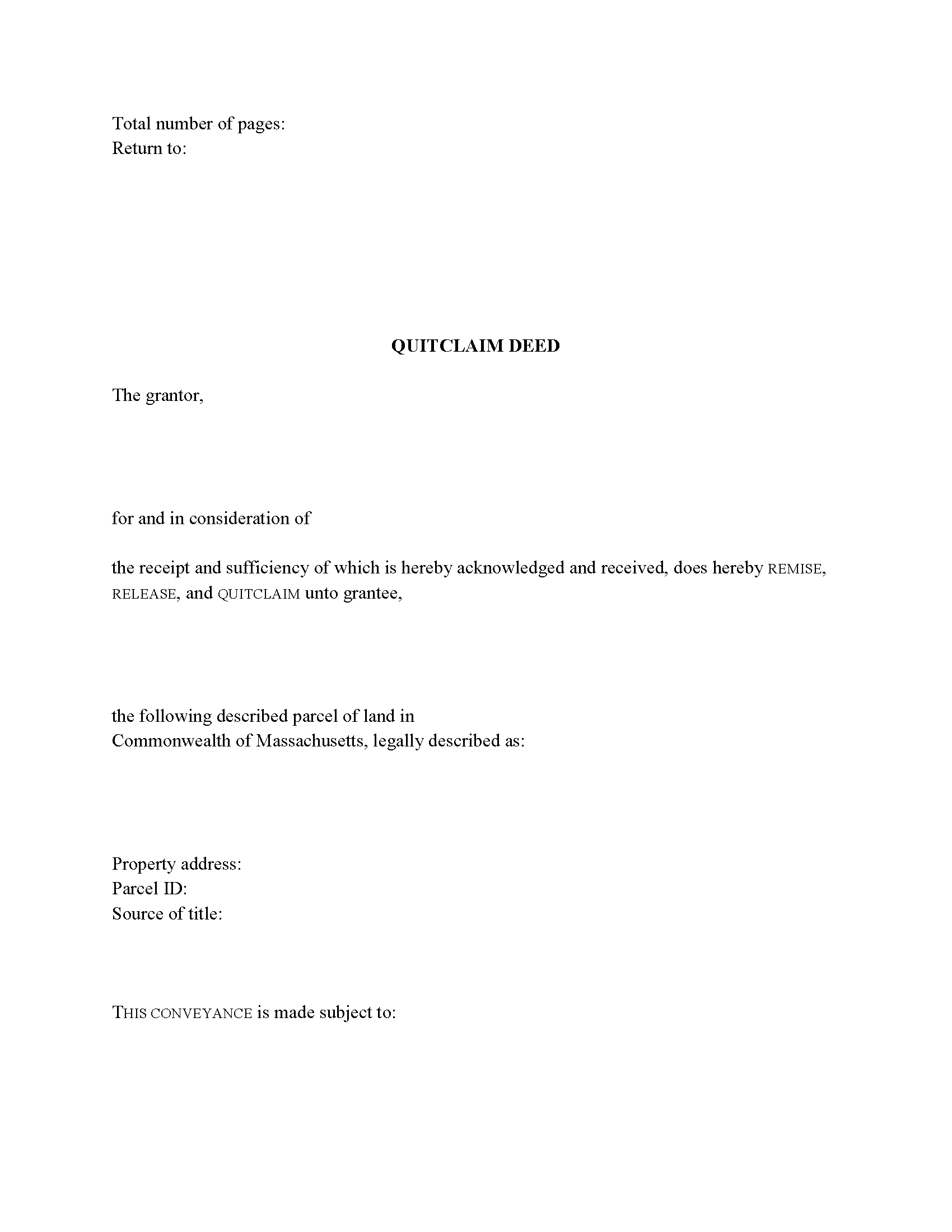
Real estate conveyances in Massachusetts are governed under Massachusetts General Laws Chapters 183 and 184.
Quitclaim deeds transfer the rights, title, and interest in real estate, if any, from the grantor (seller) to the grantee (buyer). This deed transfers property without any warranty and with no covenants of title, and is separate from the statutory quitclaim deed with limited covenants under (G.L.c. 183 sec. 17). While not statutory, this type of quitclaim deed is still valid for transferring title to real property in the State of Massachusetts. It is especially useful for transactions between family members, clearing title, and in cases of divorce.
In addition to meeting all state and local standards for recorded documents, a lawful deed identifies the name, address, and marital status of each grantor and grantee (G.L.c. 183 sec. 6). State law requires that all land records contain information on how the grantee will hold title (G.L.c. 184 sec. 7). For Massachusetts residential property, the primary methods for holding title are tenancy in common, joint tenancy, and tenancy by the entirety. A grant of ownership of real estate to two or more persons, regardless of mari... More Information about the Massachusetts Quitclaim Deed
Quitclaim Deed with Covenants
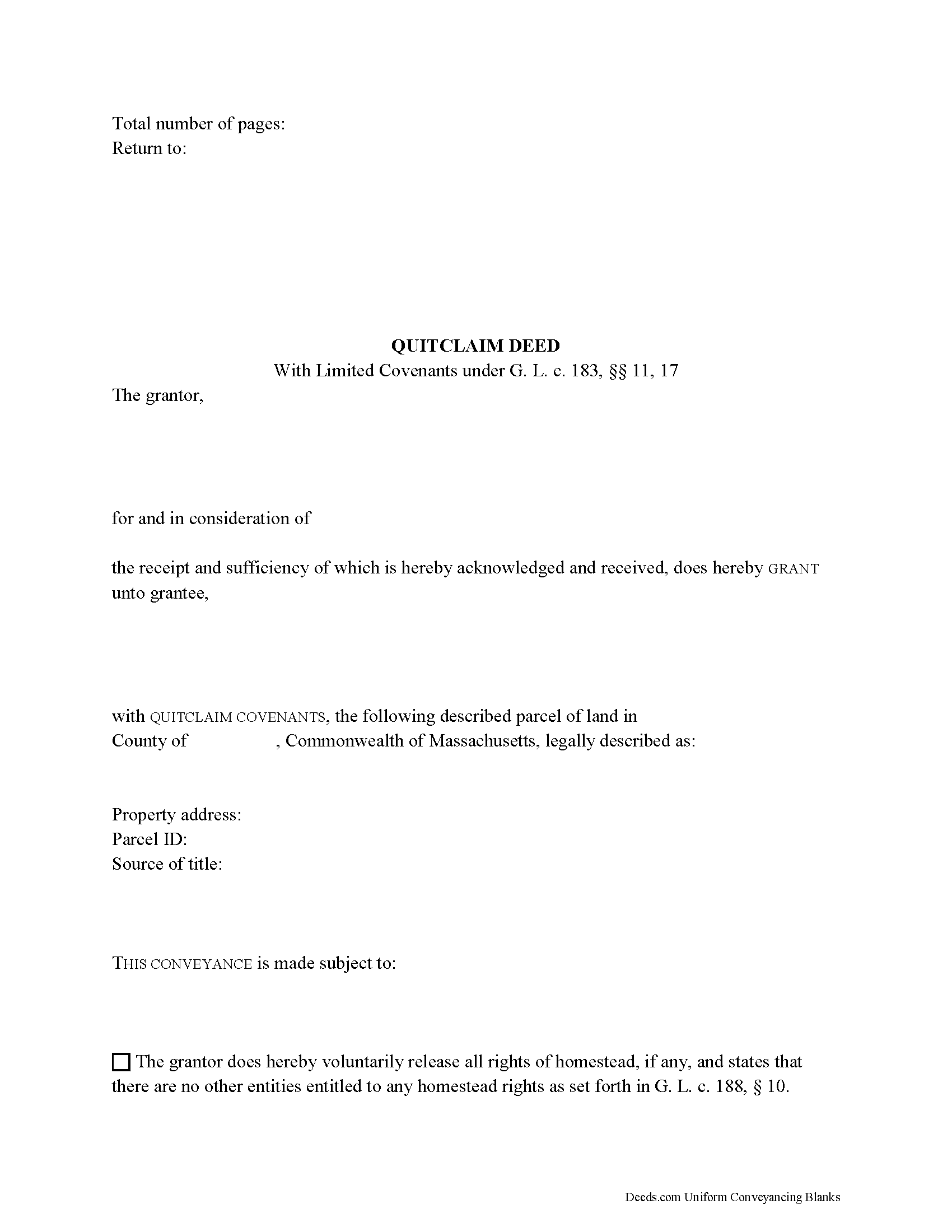
Real estate conveyances in Massachusetts are governed under Massachusetts General Laws Chapters 183 and 184.
Quitclaim deeds with limited covenants are used to transfer the rights, title, and interest in real estate, if any, from the grantor (seller) to the grantee (buyer). When using this kind of deed, the grantor "covenants that the property is free from all encumbrances," and that he will "warrant and defend the same to the grantee forever against the lawful claims and demands of all persons claiming by, through or under the grantor, but against none other" (G.L.c. 183 sec. 17). Because of these covenants, this form is valid as-is for use as a special warranty deed in Massachusetts.
In addition to meeting all state and local standards for recorded documents, a lawful deed identifies the name, address, and marital status of each grantor and grantee (G.L.c. 183 sec. 6). State law requires that all land records contain information on how the grantee will hold title (G.L.c. 184 sec. 7). For Massachusetts residential property, the primary methods for holding title are tenancy in common, joint tenancy, and tenancy by the entirety. A grant of ownership of real estate to two or mo... More Information about the Massachusetts Quitclaim Deed with Covenants
Gift Deed
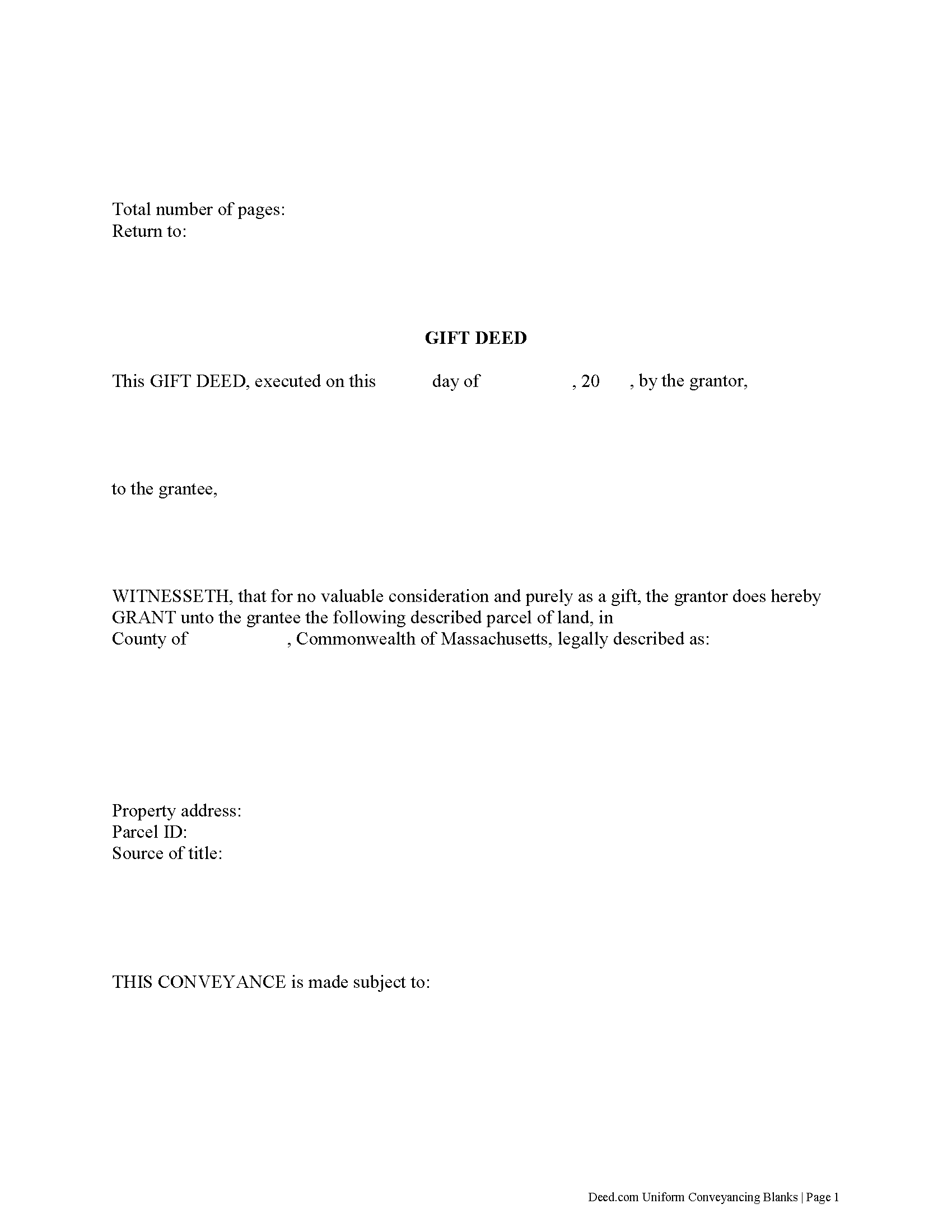
Gifts of Real Property in Massachusetts
A gift deed, or deed of gift, is a legal document voluntarily transferring title to real property from one party (the grantor or donor) to another (the grantee or donee). A gift deed typically transfers real property between family or close friends. Gift deeds are also used to donate to a non-profit organization or charity. The deed serves as proof that the transfer is indeed a gift and without consideration (any conditions or form of compensation).
Valid deeds must meet the following requirements: The grantor must intend to make a present gift of the property, the grantor must deliver the property to the grantee, and the grantee must accept the gift. Gift deeds must contain language that explicitly states no consideration is expected or required, because any ambiguity or reference to consideration can make the deed contestable in court. A promise to transfer ownership in the future is not a gift, and any deed that does not immediately transfer the interest in the property, or meet any of the aforementioned requirements, can be revoked [1].
A lawful gift deed must also include the grantor's full name and marital status, as well as... More Information about the Massachusetts Gift Deed
Warranty Deed
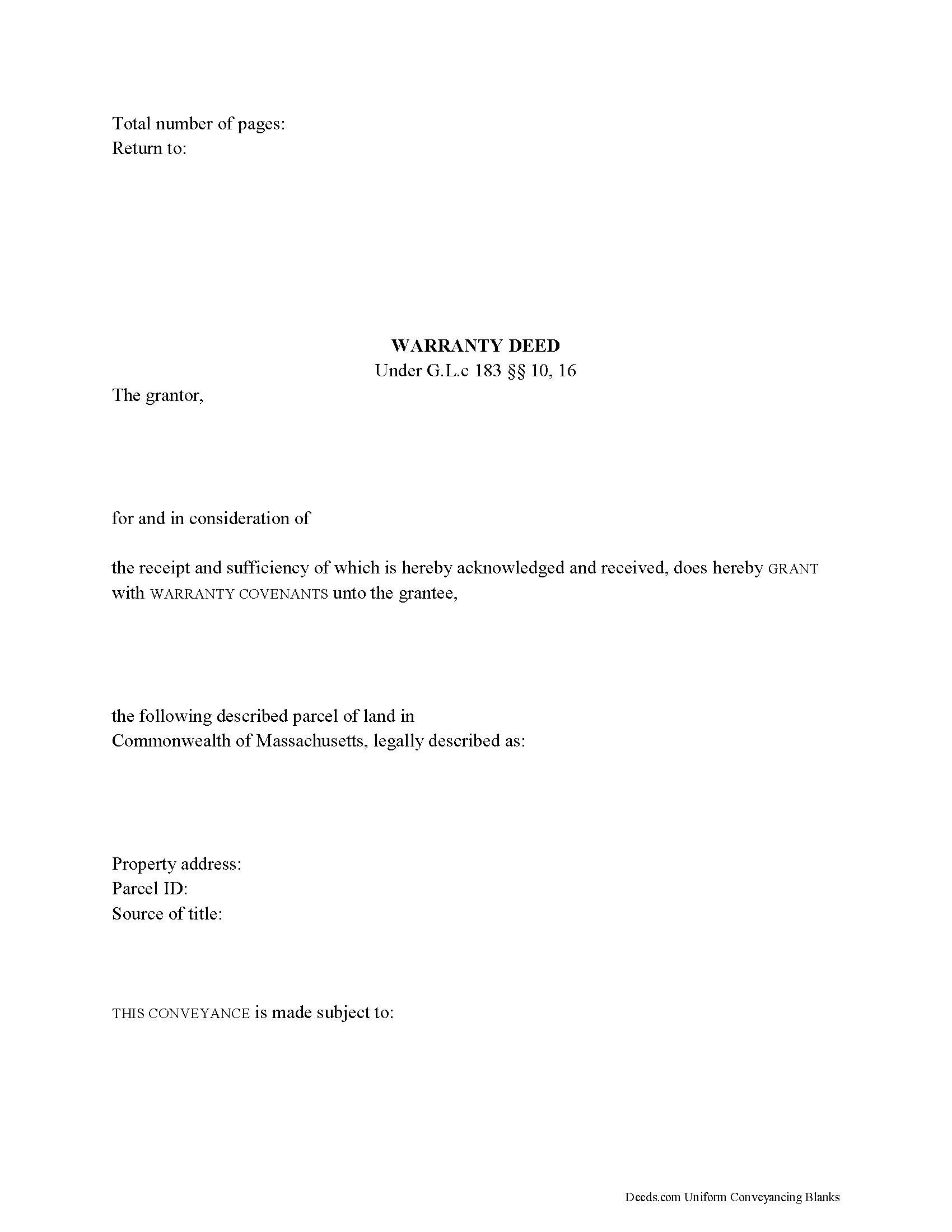
Warranty deeds in Massachusetts are statutory forms under G.L.c 183 secs. 10, 16.
A warranty deed transfers the right, title, and interest in real estate from the grantor (seller) to the grantee (buyer) [1]. This deed contains covenants on the part of the grantor that he is lawfully seized in fee simple of the granted premises; they are free from all encumbrances, except as noted in the deed; that he has good right to sell and convey the same; and that he will warrant and defend the same to the grantee and his heirs, successors and assigns forever against the lawful claims and demands of all persons (G,L.c. 183 sec. 10)
In addition to meeting all state and local standards for recorded documents, a lawful deed identifies each grantor and grantee by name, address, and marital status (G.L.c. 183 sec. 6). State law requires that all land records contain information on how the grantee will hold title (G.L.c. 184 sec. 7). For Massachusetts residential property, the primary methods for holding title are tenancy in common, joint tenancy, and tenancy by the entirety. A grant of ownership of real estate to two or more persons, regardless of marital status, is presumed to create a tena... More Information about the Massachusetts Warranty Deed
Grant Deed
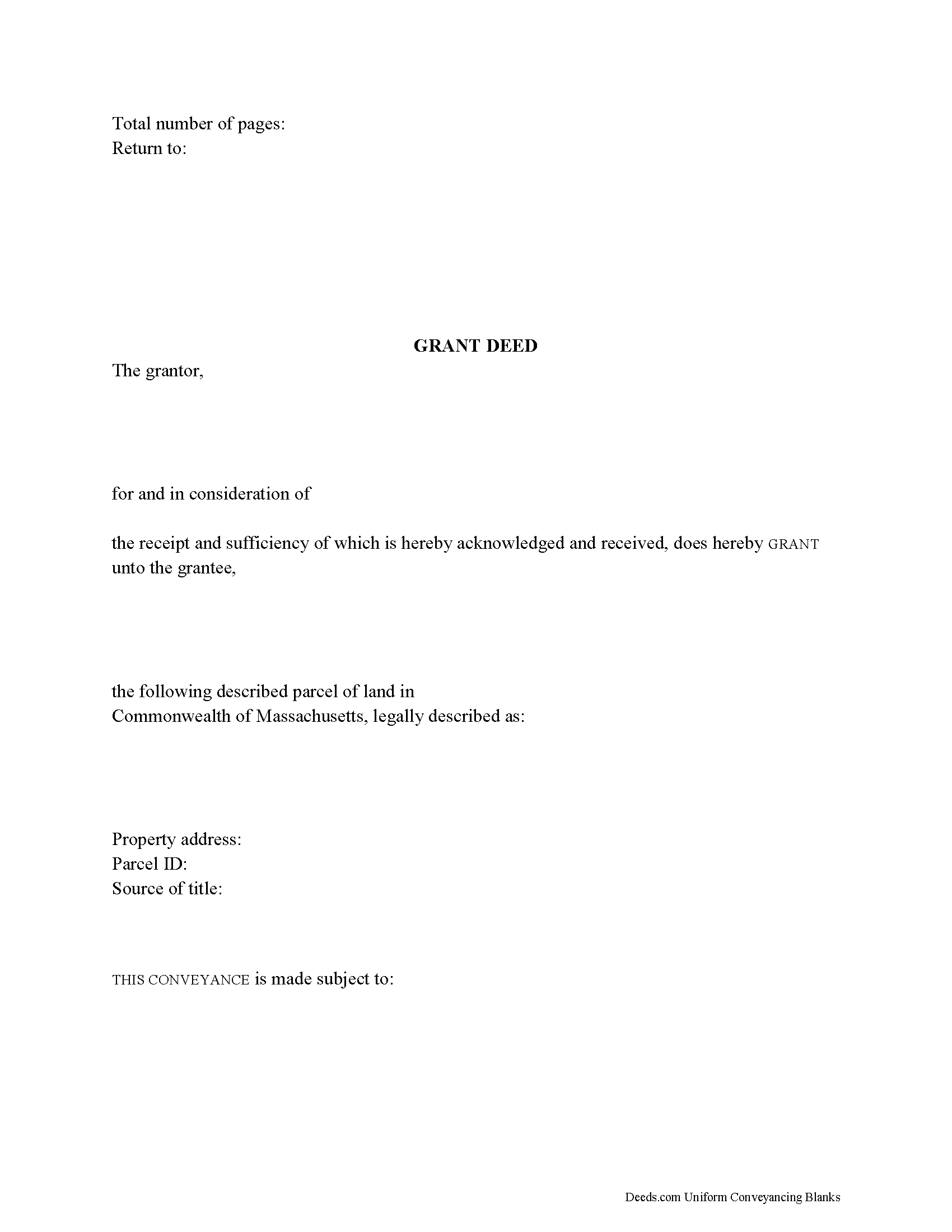
Real estate conveyances in Massachusetts are governed under Massachusetts General Laws Chapters 183 and 184. While the statutes do not specifically mention grant deeds, they are still useful for conveying title to real property in the state.
A grant deed transfers the right, title, and interest in real estate from the grantor (seller) to the grantee (buyer). Grant deeds typically include explicit covenants that the grantor is seized of, or owns, the land granted, has the right to convey the land, and that the deed discloses every lien or encumbrance associated with the property.
In addition to meeting all state and local standards for recorded documents, a lawful deed identifies each grantor and grantee by name, address, and marital status (G.L.c. 183 sec. 6). State law requires that all land records contain information on how the grantee will hold title (G.L.c. 184 sec. 7). For Massachusetts residential property, the primary methods for holding title are tenancy in common, joint tenancy, and tenancy by the entirety. A grant of ownership of real estate to two or more persons, regardless of marital status, is presumed to create a tenancy in common, unless the deed expressly s... More Information about the Massachusetts Grant Deed
Correction Deed
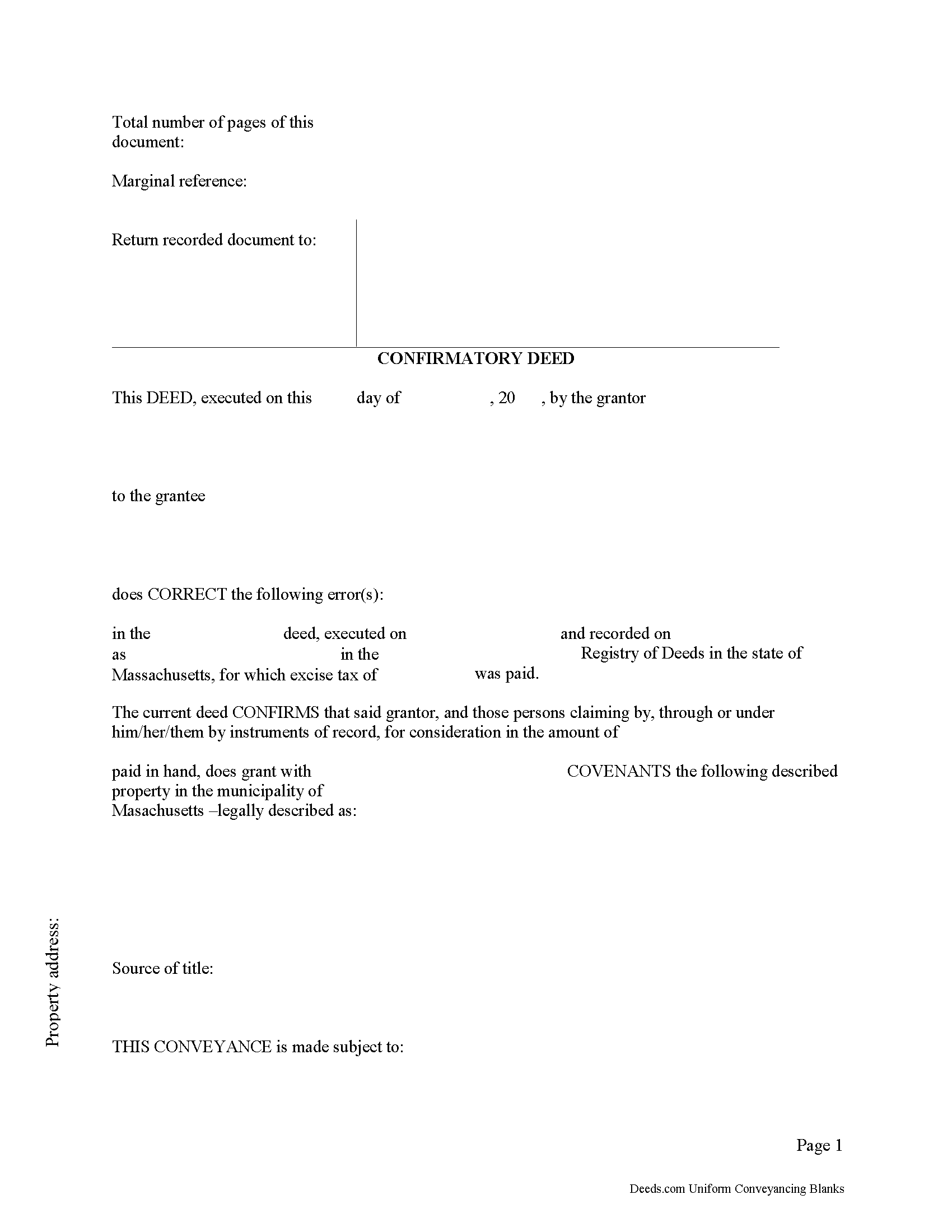
Use the confirmatory deed to correct an error in a warranty or quitclaim deed in Massachusetts.
A corrective or confirmatory deed is in effect an explanation and correction of an error in a prior instrument and passes no title. It should be executed from the original grantor to the original grantee, and it needs to be recorded, which in Massachusetts constitutes delivery of the deed. The date of the conveyance will remain unchanged, and the correction has retroactive effect, that is, it is valid as of the date of the original instrument even though it has a different execution date.
The confirmatory deed must reference the original conveyance it is correcting by type of error, date of execution and recording, and recording number and location. Beyond that, it restates the information given in the prior deed, thus reiterating and confirming it. No additional excise tax is required for such a deed, but the tax paid on the prior conveyance should be indicated.
Deeds of confirmation are most appropriate for minor errors and omissions in the original deed, such as misspelled names, omission of marital status, or typos in the legal description. More substantial changes, such a... More Information about the Massachusetts Correction Deed
Easement Deed
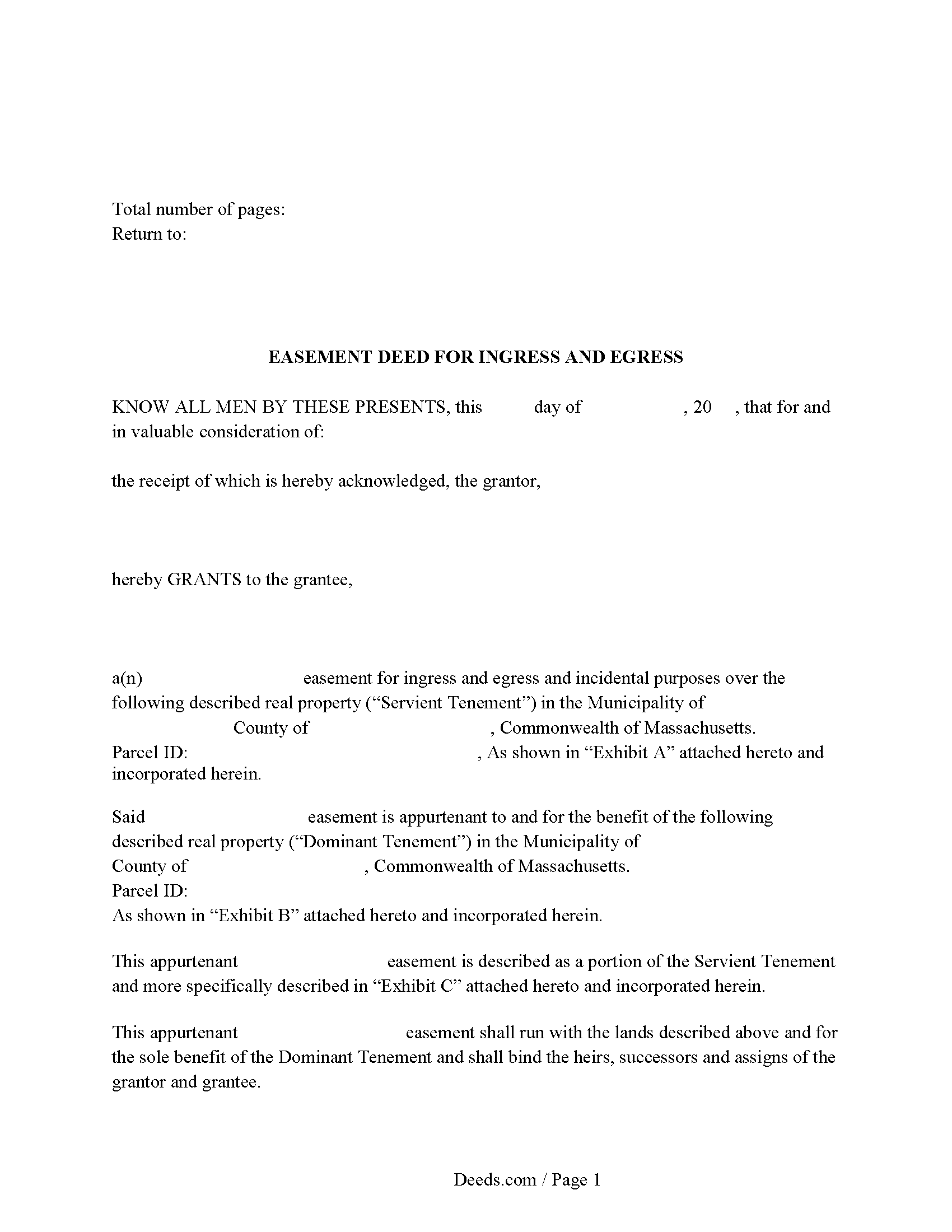
An easement is a non-possessory and non-ownership right to use another person's property for a specific use. The easement deed is the legal instrument that creates this right. Easements are either affirmative or negative and can be appurtenant or an easement in gross. An appurtenant easement benefits the dominant estate and runs with the land. Easements in gross benefit an individual or legal entity. In Massachusetts, easements can be created by deed, will, or contract; or by prescription or implication. In a conveyance of real estate in Massachusetts, all rights, easements, privileges, and appurtenances belonging to the granted estate are included in the conveyance, unless a contrary intention is stated in the deed (183-15).
According to section 187-1A of the Massachusetts General Laws, an easement of direct sunlight can be acquired over the land of another by direct grant or covenant, or by a solar access permit. The contents of a solar easement should follow the guidelines as set forth in 187-1 of the Massachusetts General Laws. When a person erects a house or other structure with windows overlooking another's land, they do not, by the mere continuance of such windows, acquir... More Information about the Massachusetts Easement Deed
Termination of Easement
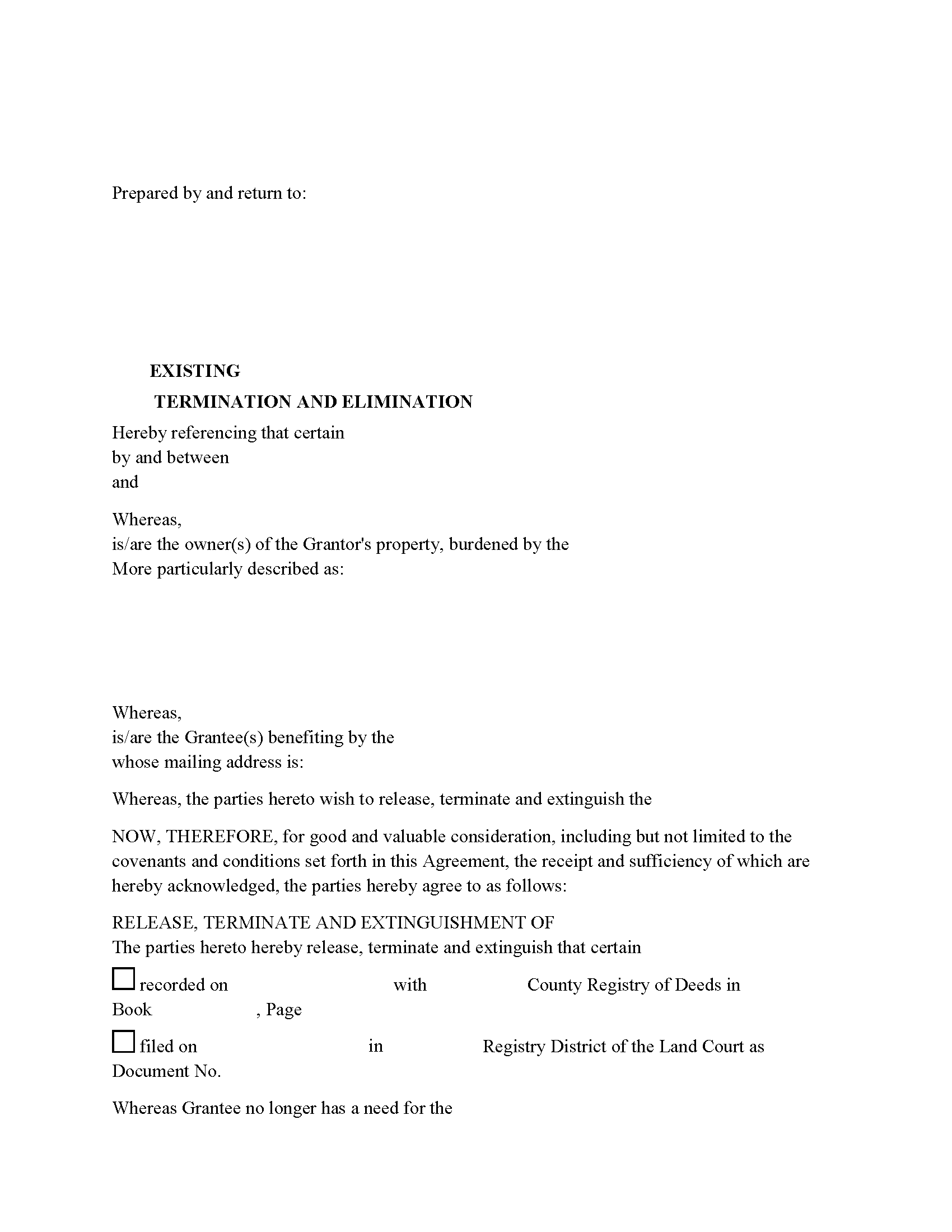
Use this form to release, terminate, extinguish a previously recorded document that involves access to and from a property.
Documents such as:
1. Easement Deeds or Agreements (An easement is a non-possessory interest in land, granting the right to use someone else's property for a specific purpose, like a driveway or utility line)
2. Access Roads
3. Right of Ways
4. Utility Easements (Power, Gas, Water, Sewer, Etc.)
5. Drainage Easements
This document allows the owner of the land, burdened by the access and the party that benefits from the access, to sign an agreement releasing the property from such access, ... More Information about the Massachusetts Termination of Easement
General Durable Power of Attorney
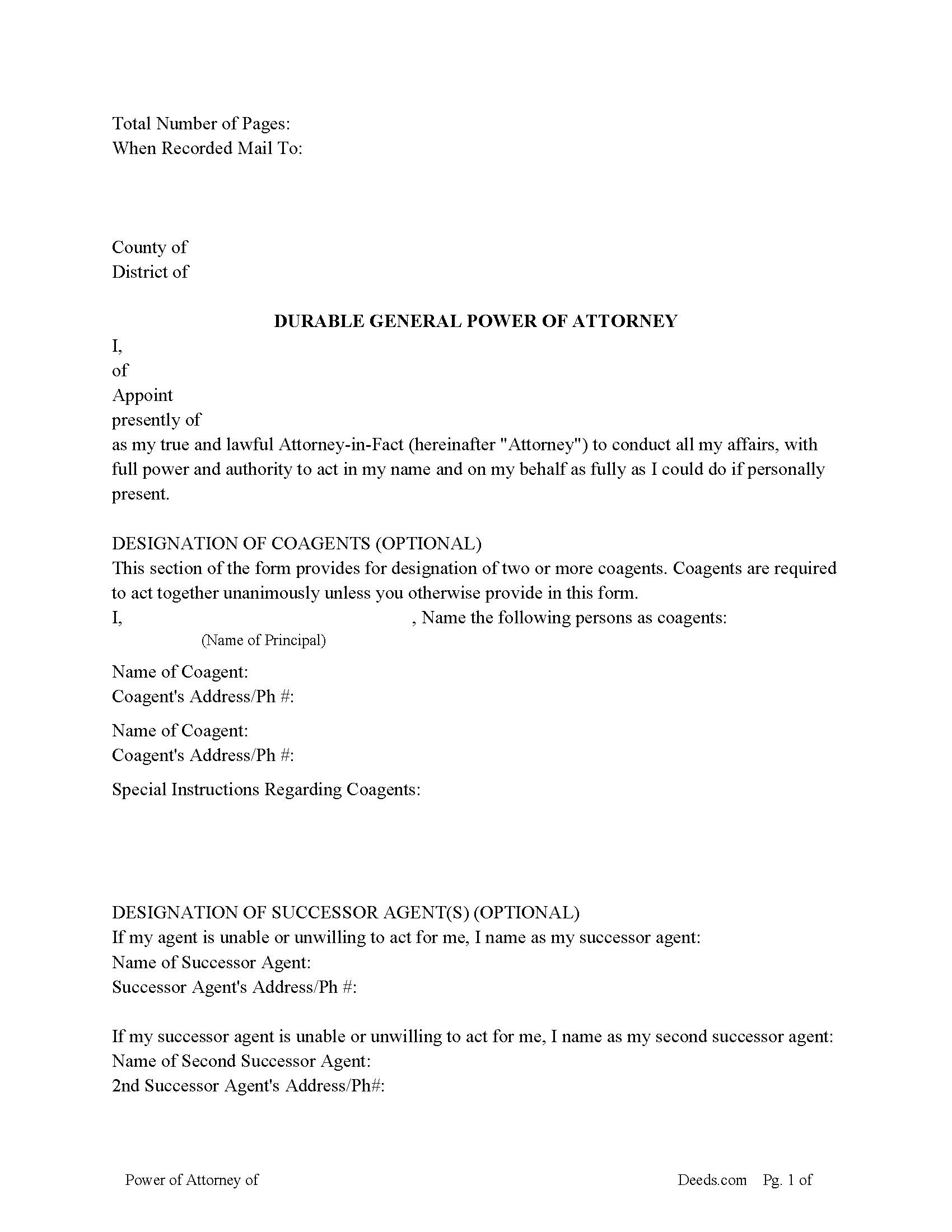
This is a Durable General Power of Attorney governed by Massachusetts Uniform Probate Code, M.G.L. c.190B. A power of attorney is considered durable when (a principal, in writing, designates another as his attorney in fact and the writing contains the words, "This power of attorney shall not be affected by subsequent disability or incapacity of the principal", or "This power of attorney shall become effective upon the disability or incapacity of the principal", or similar words showing the intent of the principal that the authority conferred shall continue notwithstanding the subsequent disability or incapacity of the principal.)(MA Gen L ch 201B statute 1, Section 1. (a))
Some of the powers an agent/attorney in fact can perform behalf of the principal, each one can be denied or amended to fit the required needs of the principal.
POWER TO USE FUNDS TO MAINTAIN LIFESTYLE.
BANKING POWERS.
STOCK AND BOND POWERS.
POWER TO ACCESS SAFE DEPOSIT BOXES.
POWER TO COLLECT PROPERTY.
POWER TO BORROW.
REVERSE MORTGAGE POWERS.
HEALTH CARE DECISIONS.
FUNERAL PLANS.
POWER WITH RESPECT TO TAX MATTERS.
BUSINESS INTERESTS.
POWER TO BUY AND SELL.
POWER TO MANAGE &: SUPERVISE PROP... More Information about the Massachusetts General Durable Power of Attorney
Specific Durable Power of Attorney for the Sale of Real Property
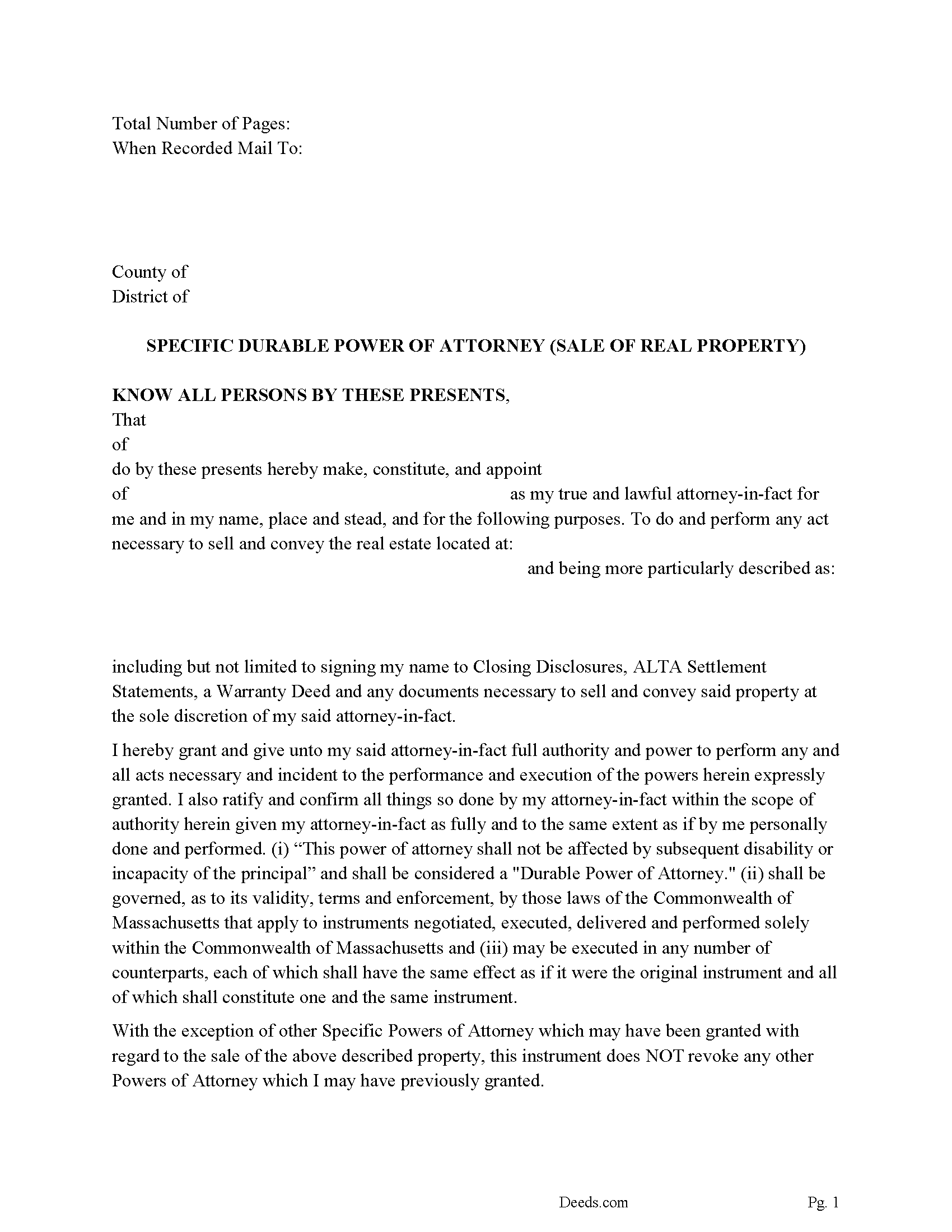
This is a specific Power of Attorney form that allows an Agent of your choice the right to sell property on your behalf as defined.
(i) "This power of attorney shall not be affected by subsequent disability or incapacity of the principal" and shall be considered a "Durable Power of Attorney." (ii) shall be governed, as to its validity, terms and enforcement, by those laws of the Commonwealth of Massachusetts that apply to instruments negotiated, executed, delivered and performed solely within the Commonwealth of Massachusetts.
With the exception of other Specific Powers of Attorney which may have been granted with
regard to the sale of the subject property, this instrument does NOT revoke any other Powers of Attorney which you may have previously granted.
(Massachusetts Specific DPOA Package includes form, guidelines, and completed example) For use in Massachusetts only.
... More Information about the Massachusetts Specific Durable Power of Attorney for the Sale of Real Property
Specific Durable Power of Attorney for the Purchase of Real Property
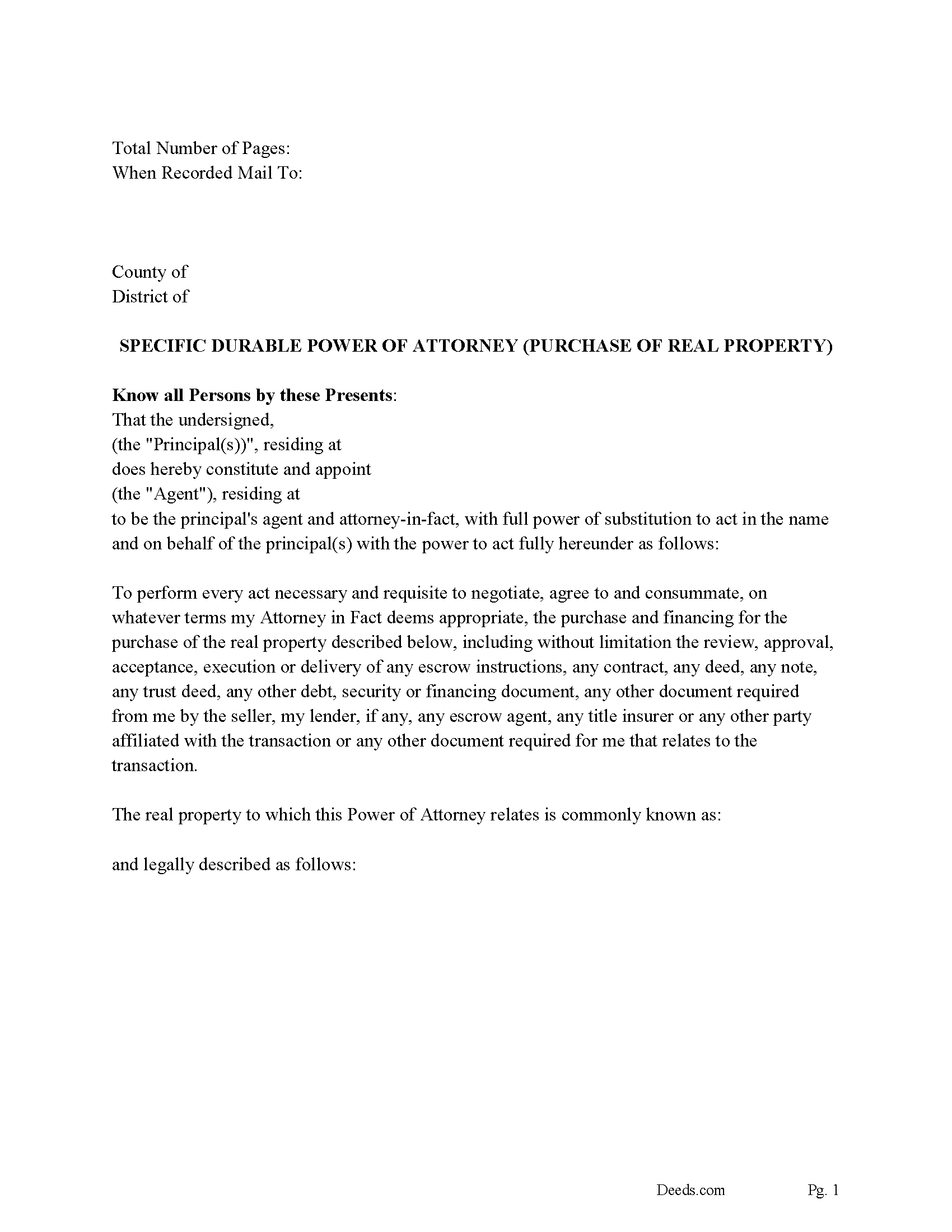
This form is used for the purchase of real property located in Massachusetts. The principal designates an agent and empowers him/her/them to act in all necessary legal documents required for the purchase and financing of the real property described.
(i) This power of attorney shall become effective immediately upon the execution of same and shall be considered a "Durable Power of Attorney." (ii) shall be governed, as to its validity, terms and enforcement, by those laws of the Commonwealth of Massachusetts that apply to instruments negotiated, executed, delivered and performed solely within the Commonwealth of Massachusetts, and (iii) may be executed in any number of counterparts, each of which shall have the same effect as if it were the original instrument and all of which shall constitute one and the same instrument.
Included is an Agents Certification Form, fully formatted for recording. If the Agent is acting immediately this form is often recorded with the POA.
(Massachusetts Specific POA Package includes form, guidelines, and completed example) For use in Massachusetts only. ... More Information about the Massachusetts Specific Durable Power of Attorney for the Purchase of Real Property
Mortgage Deed and Promissory Note
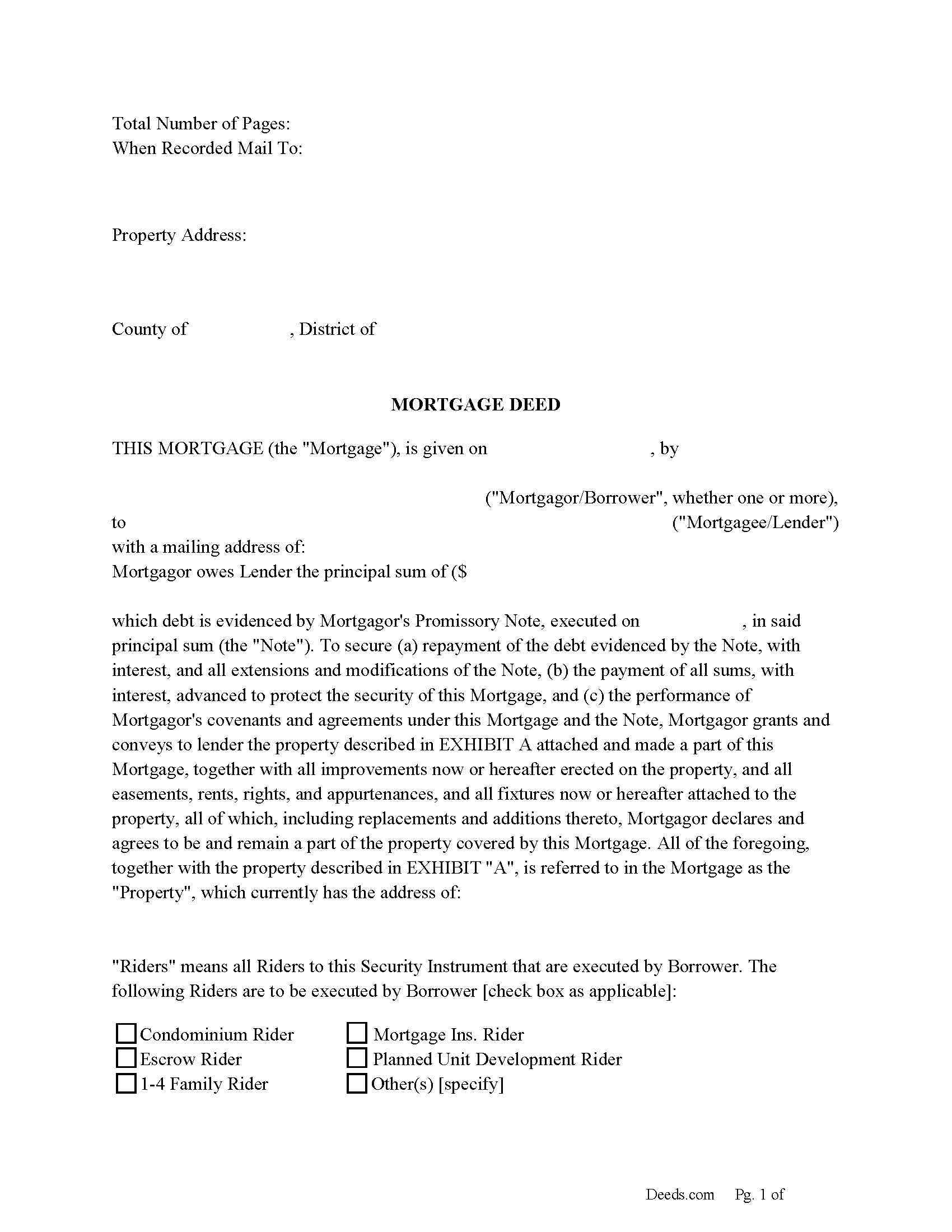
Use this form for financing real property- residential, rental units, condominiums, vacant land, small commercial and planned unit developments. A mortgage deed has full force and effect when it includes:
''Mortgage covenants''
(In a conveyance of real estate the words ''mortgage covenants'' shall have the full force, meaning and effect of the following words, and shall be applied and construed accordingly: ''The mortgagor, for himself, his heirs, executors, administrators and successors, covenants with the mortgagee and his heirs, successors and assigns, that he is lawfully seized in fee simple of the granted premises; that they are free from all encumbrances; that the mortgagor has good right to sell and convey the same; and that he will, and his heirs, executors, administrators and successors shall, warrant and defend the same to the mortgagee and his heirs, successors and assigns forever against the lawful claims and demands of all persons; and that the mortgagor and his heirs, successors or assigns, in case a sale shall be made under the power of sale, will, upon request, execute, acknowledge and deliver to the purchaser or purchasers a deed or deeds of release confirming su... More Information about the Massachusetts Mortgage Deed and Promissory Note
Discharge of Mortgage
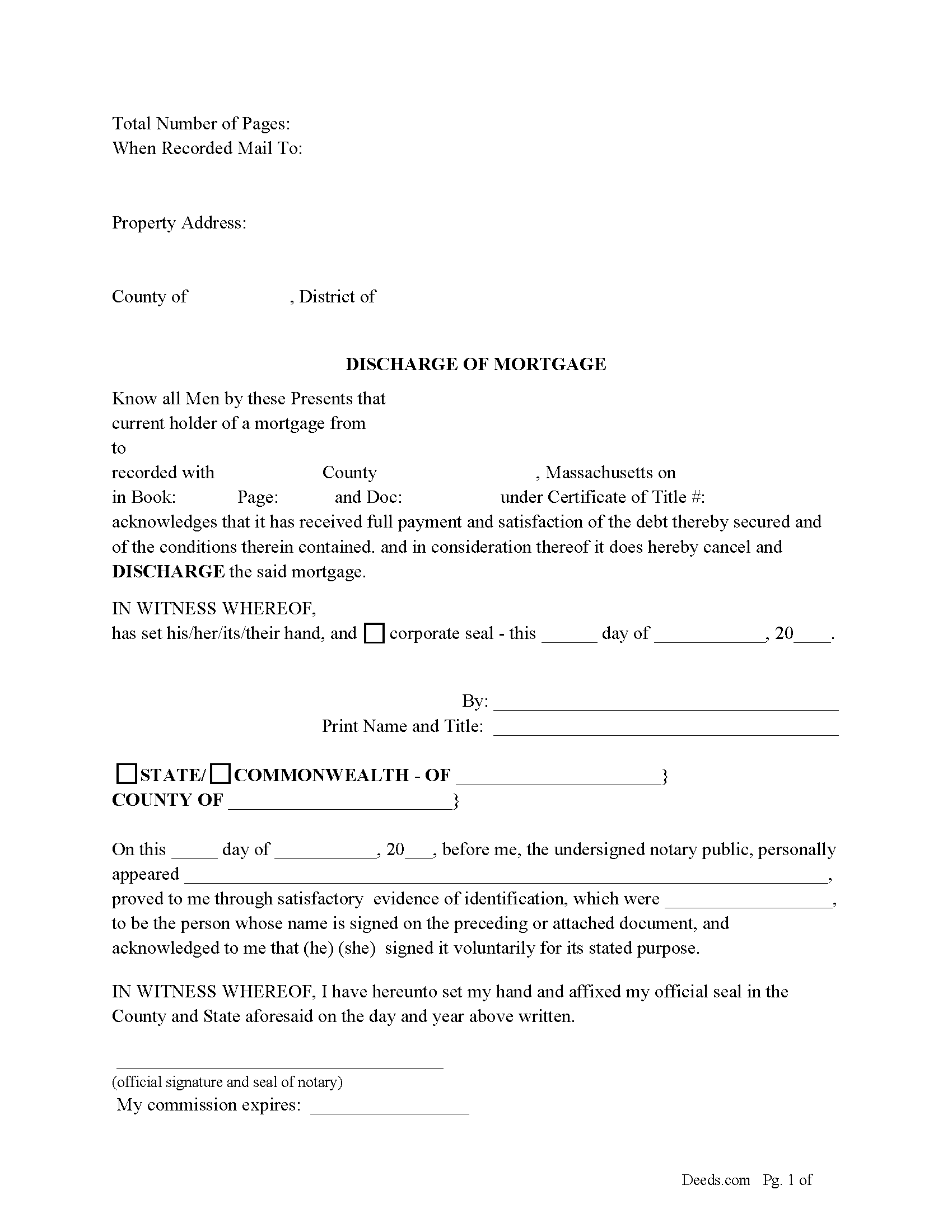
Use this form to fully release/discharge a mortgage when paid in full.
(''Discharge'', a duly executed and acknowledged deed of release of a mortgage or other written instrument that, by its terms, discharges or releases a mortgage or the lien thereof or acknowledges payment or satisfaction of a mortgage or the debt or obligation secured by a mortgage or the conditions therein contained) (Section 54. (a))
(A mortgage may be discharged by 1 of 2 or more joint holders of a mortgage or the mortgagee, mortgage servicer or note holder, or an heir, executor, administrator, successor or assignee thereof, but, the discharge shall comply with the requirements of subsection (b) of section 55. The discharge shall have the same effect as a deed of release, and may be recorded when duly executed and acknowledged or on proof of its execution in accordance with sections 34 to 41, inclusive, or on such other proof of its due execution by credible evidence in the form of corroborating documents or affidavits establishing the authenticity of the discharge and the execution thereof and, in that case, the discharge and the corroborating documents or affidavits may be recorded along with or as exhib... More Information about the Massachusetts Discharge of Mortgage
Assignment of Mortgage
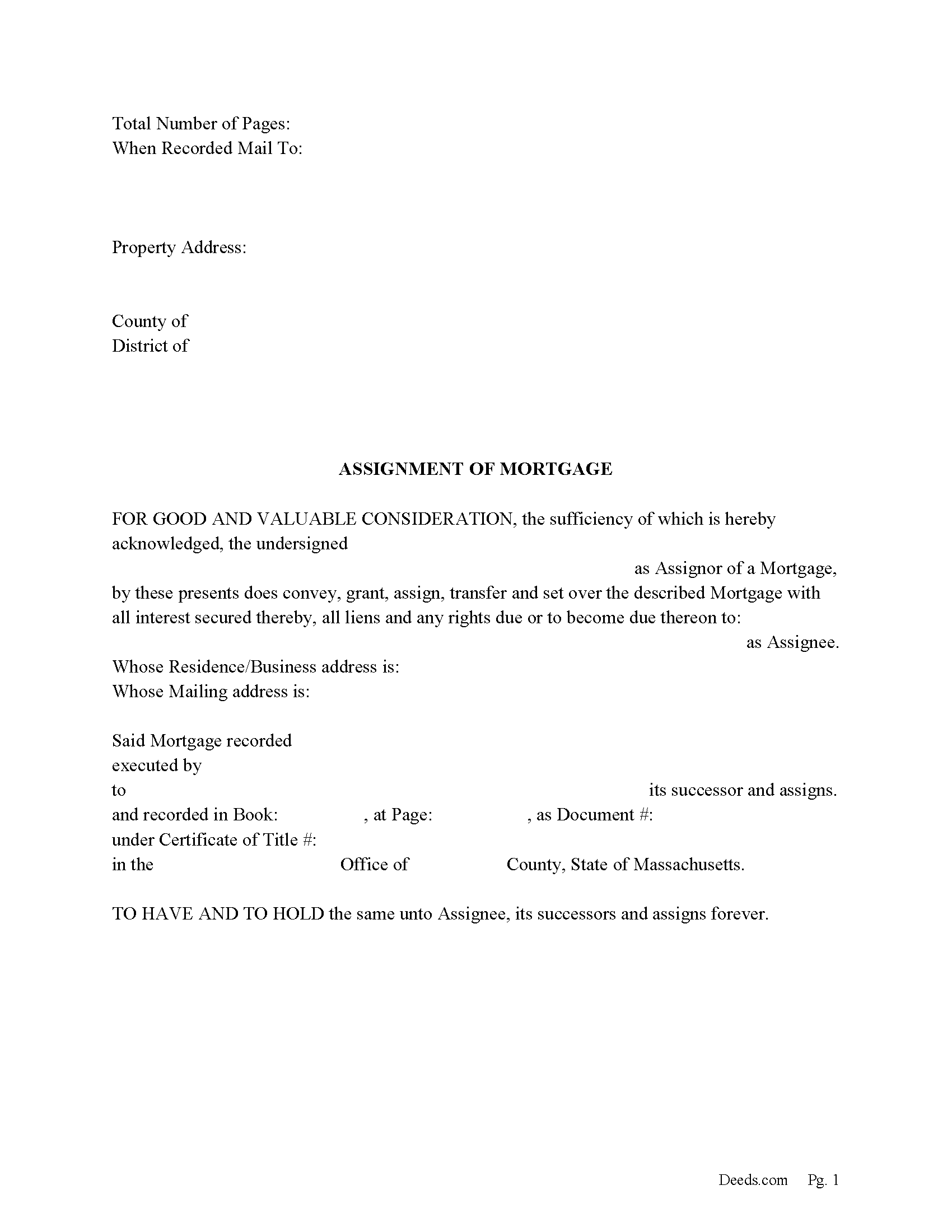
Use this form to assign an existing mortgage to another party.
Formatted for recordation in the [Registry of Deeds] or [Land Court Registry], approximately 15 to 20% of land in Massachusetts is registered land, meaning the land is insured by the Commonwealth of Massachusetts, and documents affecting real property must be recorded in the Land Court.
Section 28. In an assignment of a mortgage of real estate the word ''assign'' shall be a sufficient word to transfer the mortgage, without the words ''transfer and set over''.
Mortgage broker endorsement included.
Section 6D. Every mortgage and assignment of mortgage secured by residential property, as defined in section 1 of chapter 255E, presented for record, in which a mortgage broker, as defined in said section 1 of said chapter 255E, is involved shall contain or have endorsed upon it the name, post office address and license number of the mortgage broker and, if applicable, the mortgage loan originator, as defined in section 1 of chapter 255F, responsible for placing the mortgage loan with the mortgagee. This endorsement, or notation that no mortgage broker or mortgage loan originator was involved in the mortgage, if known... More Information about the Massachusetts Assignment of Mortgage
Disclaimer of Interest
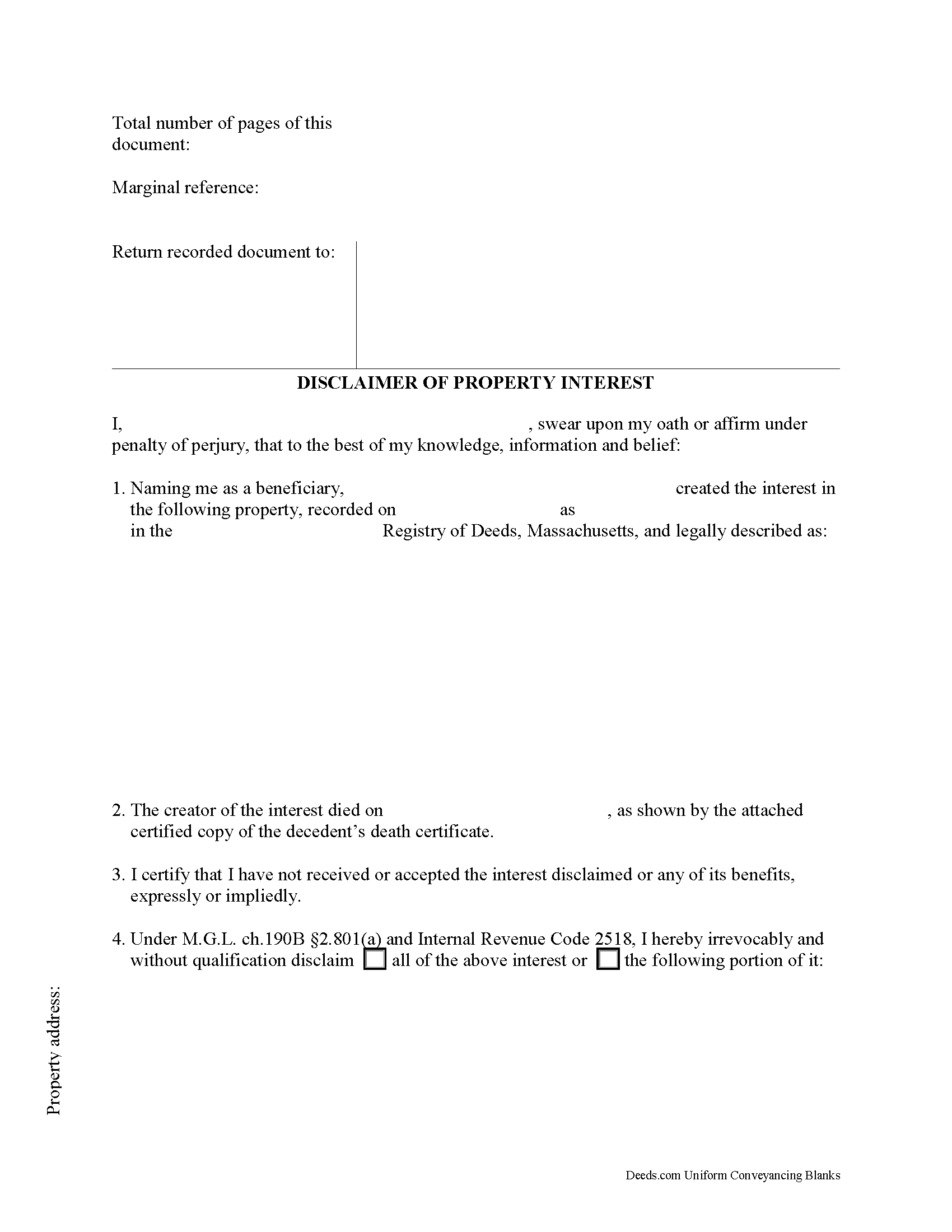
A beneficiary of an interest in property in Massachusetts can renounce all or part of a bequeathed interest in, or power over, that property under M.G.L. ch.190B 2.801(a). This only works as long as it has not been accepted through actions that indicate ownership or been transferred in any way (M.G.L. ch.190B 2.801(h)). The written disclaimer must identify the creator of the interest, provide a description of the disclaimed interest, a declaration of the disclaimer and its extent, and the disclaiming party must sign in front of a notary (M.G.L. ch.190B 2.801(d)).
File the disclaimer within nine months of the transfer (e.g., the death of the creator of the interest) with the probate court (M.G.L. ch.190B 2.801(c) and (e)). In the case of real property, acknowledge the disclaimer as is required for a deed and record the disclaimer in the registry of deeds for the county or district in which the property is located, which will constitute notice to everyone. In addition, deliver a copy of the disclaimer to the person or legal entity having custody or possession of the property.
A disclaimer is irrevocable and binding for the disclaiming party, so be sure to consult an attorney wh... More Information about the Massachusetts Disclaimer of Interest
Trustee Deed
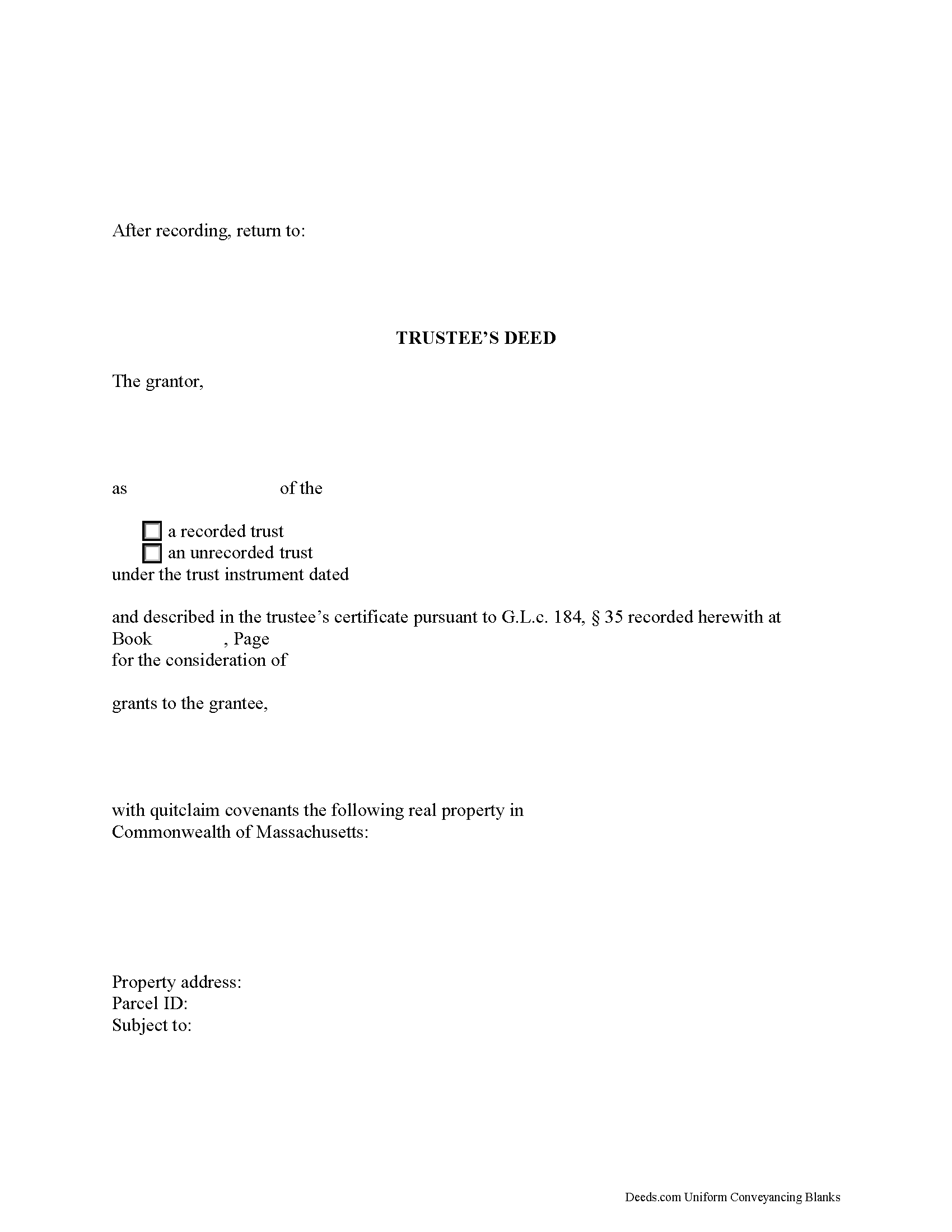
Used to convey title to real property held in a living (non-testamentary) trust, the trustee's deed takes its name from the party executing the conveyance, the trustee. In Massachusetts, the trustee's deed typically carries quitclaim covenants guaranteeing title against claims arising only under the grantor's duration of ownership.
Trusts are governed by the Massachusetts Uniform Trust Code at chapter 203E of the Massachusetts General Laws. In a trust, the trustee holds legal title to property conveyed into trust by the trust's settlor, for the benefit of a beneficiary. A beneficiary is someone with a present or future interest in the trust (G.L.c. 203E, 103). The terms of the trust, including a designation of the trustee, the trustee's powers, and the trust's beneficiary, are set forth in the trust instrument, which is executed by the settlor and generally not recorded.
Conveyances by trustee are generally accompanied by a trustee's certificate under G.L.c. 184, 35, evidencing the trustee's authority in the transaction at hand. The trustee's certificate is recorded separately, either simultaneously with the deed conveying real property into trust, or when the trustee acts up... More Information about the Massachusetts Trustee Deed
Personal Representative Deed of Sale
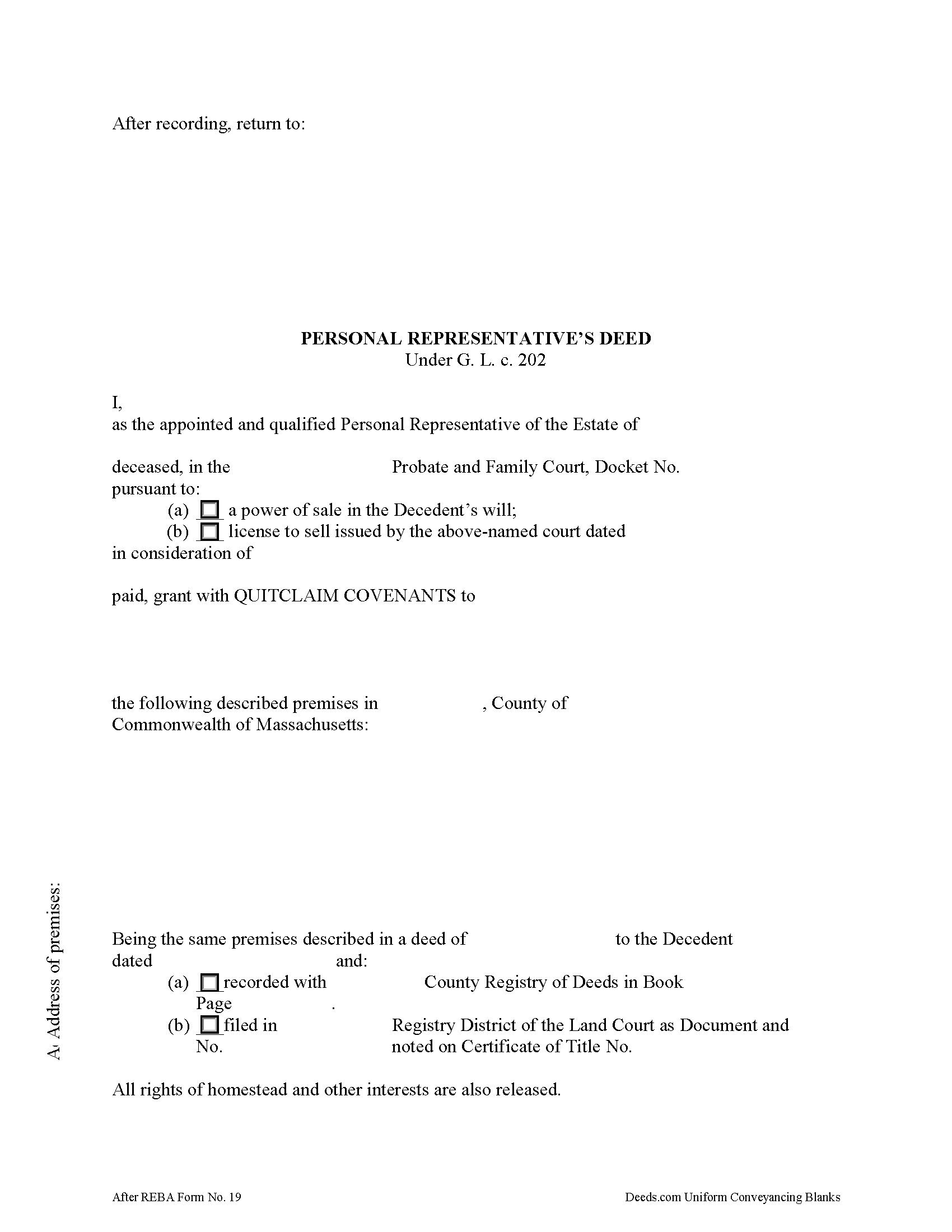
A personal representative's deed is a fiduciary instrument executed by a personal representative (PR), who is appointed by the Probate and Family Court to administer a decedent's estate.
Use a deed of sale to convey title to a purchaser pursuant to a power of sale in the decedent's will and/or decree (license) following a petition of the court. A decree is required for all informally probated estates, regardless of the existence of a power of sale. Seek legal advice to ensure all prerequisites are met.
A PR deed conveys title with quitclaim covenants. The grantor of a PR deed warrants the title to the grantee against the lawful claims of persons claiming by, through, or under the grantor. Conveyances of title made by a PR to a purchaser for value are free from claims of general creditors and of legatees and devisees under the decedent's will, pursuant to REBA Title Standard No. 10.
The deed must meet the same standards for form and content as other instruments transferring title, and also contain details relating to the deceased owner. Depending on the situation, the PR might need to include additional supporting documents prior to recording.
Consult a lawyer with que... More Information about the Massachusetts Personal Representative Deed of Sale
Personal Representative Deed of Distribution
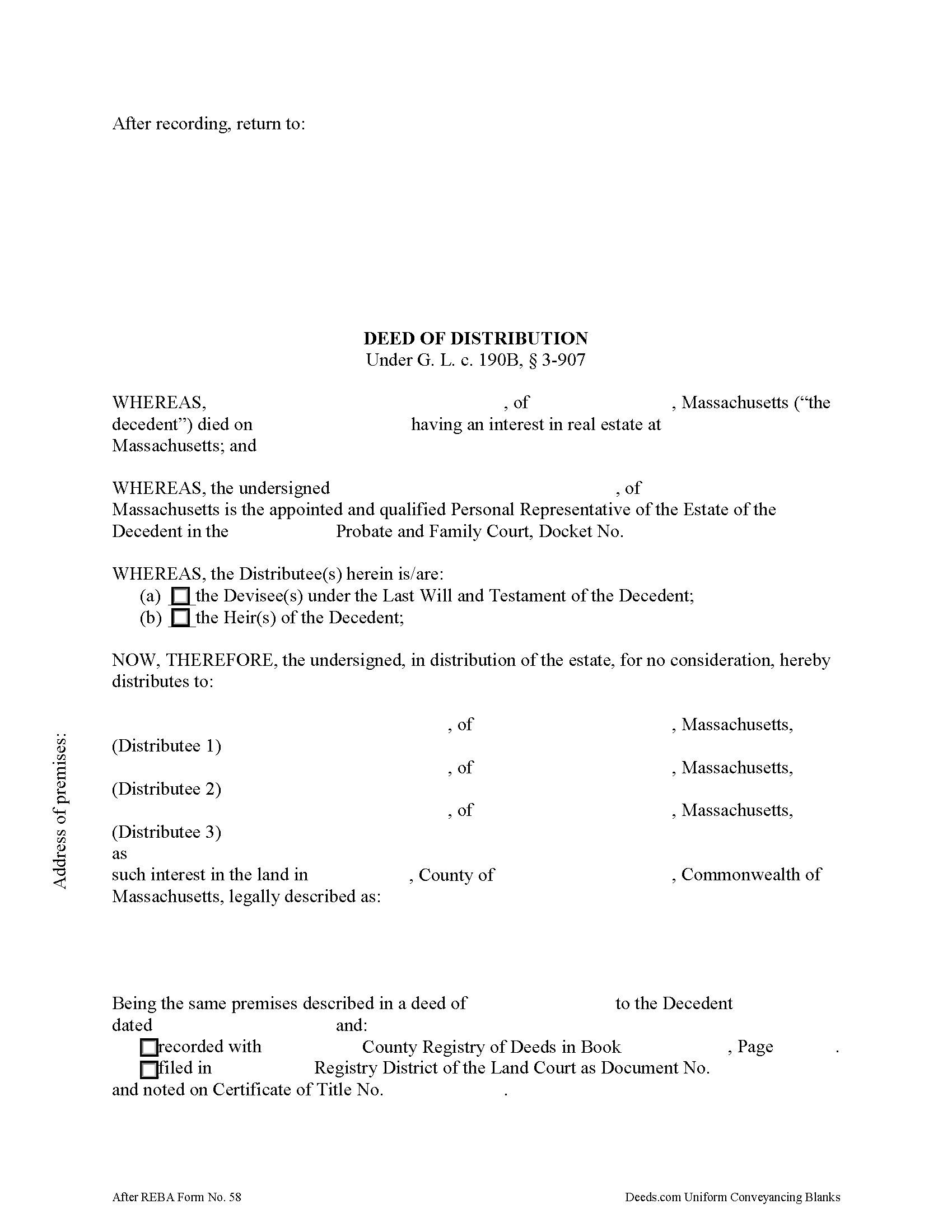
A deed of distribution is a fiduciary instrument executed by a personal representative (PR), who is appointed by the Probate and Family Court to administer a decedent's estate. Use a deed of distribution under G. L. c. 190B, 3-907 to distribute a decedent's real property to devisees under the decedent's will or to heirs when the decedent has died intestate.
A deed of distribution provides evidence of the distributee's title. It must meet the same standards for form and content as a standard deeds, but also requires information about the decedent. Depending on the situation, the PR might need to include additional supporting documentation.
Recorded in the Registry of Deeds in the county where the subject property is located, the deed brings the chain of title up to date after the decedent passes.
Consult a lawyer with questions about probate proceedings and deeds of distribution in the Commonwealth of Massachusetts.
(Massachusetts Personal Representative DOD Package includes form, guidelines, and completed example)... More Information about the Massachusetts Personal Representative Deed of Distribution
Notice of Contract
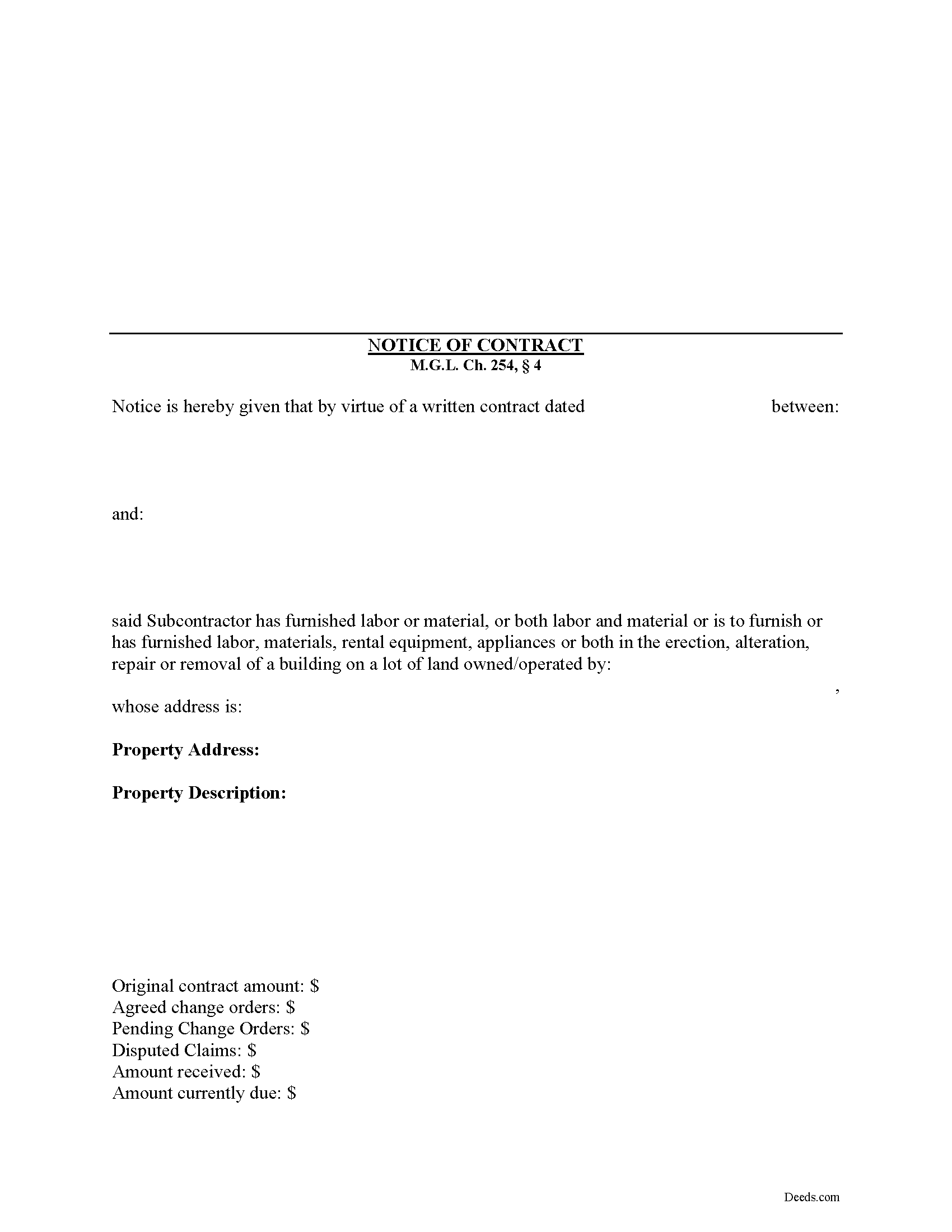
Under Massachusetts law, a contractor or subcontractor furnishing labor, material, equipment, or tools must file and record a Notice of Contract to claim a mechanic's lien. The Notice of Contract also puts all parties on notice that the party filing may have a claim for a mechanic's lien.
Whoever furnishes labor, including subcontractor construction management services, or furnishes material, labor and material, rental equipment, appliances or tools, or who performs professional services, under a written contract with a contractor, or with a subcontractor of the contractor, may file or record in the registry of deeds for the county or district where such land lies a notice of his contract. M.G.L. C. 254, 4.
The Notice of Contract contains the date of the contract, the names of the parties to the contract, the property owner's name and address, the address of the subject property and a legal land description, and a description of the contract amount as well as any modifications and amounts in dispute. Id.
The Notice should be filed or recorded any time after the written contract is executed, whether or not the date for performance stated in the written contract has passed ... More Information about the Massachusetts Notice of Contract
Notice of Identification
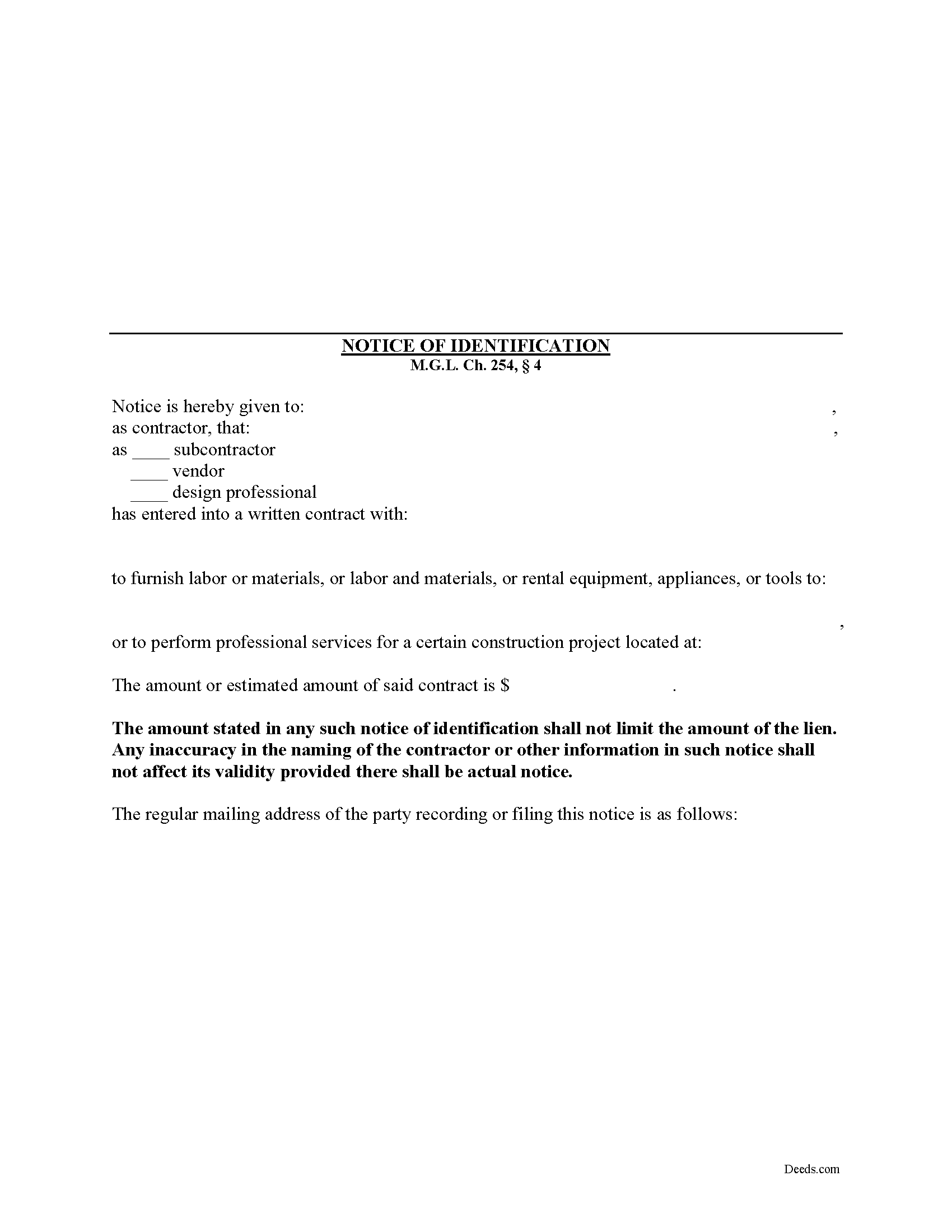
Subcontractors, vendors, and design professionals involved in a work of improvement must send a special type of notice when they have not contracted directly with the original contractor or property owner and are working under another party. This preserves these individual's rights to a mechanic's lien while letting the owner know who is involved in the job and may have a later claim if unpaid.
In Massachusetts, a lien claimant without a direct contractual relationship with the original contractor, except for liens for labor, can only claim an amount of lien less than or equal to the amount due or to become due under the subcontract between the original contractor and the subcontractor whose work includes the work of the person claiming the lien. M.G.L. Ch. 254, 4. However, if the claimant files a Notice of Identification within thirty (30) days of commencement of his performance, lien rights are preserved for the full amount of services or materials expended. Id.
The Notice of Identification contains the following information: 1) contractor's name; 2) name of the party sending the notice; 3) whether the claimant is a subcontractor, vendor, or design professional; 4) name of... More Information about the Massachusetts Notice of Identification
Statement of Account
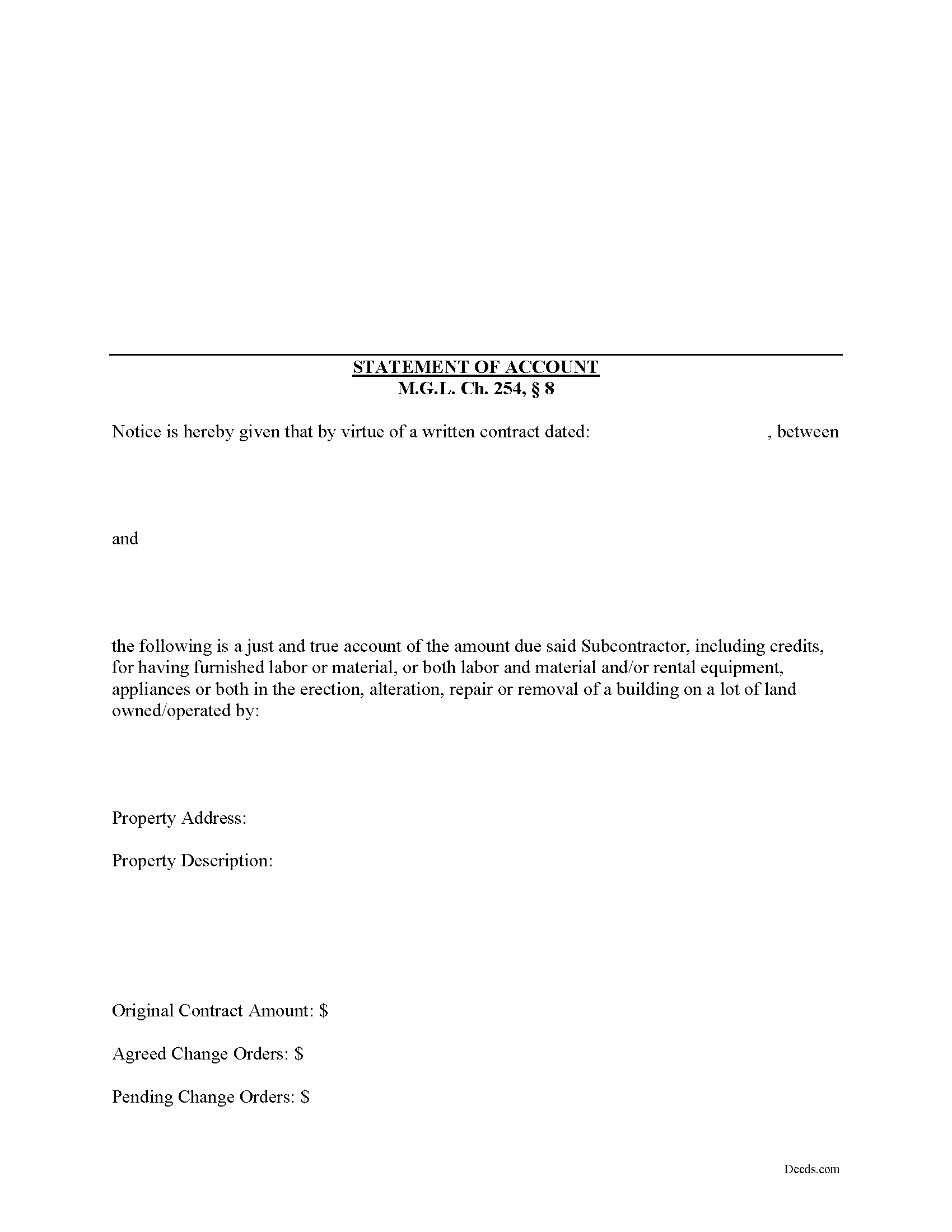
According to the Massachusetts mechanic's lien procedure, a Statement of Account is the second document that must be filed.
The time for filing depends upon whether certain other filings have been made. For instance, if a Notice of Substantial Completion has been filed or recorded, the Statement of Account must be filed ninety (90) days after the filing or recording of the Notice of Substantial Completion. M.G.L. Ch. 254, 8.
If a Notice of Termination has been filed or recorded, the Statement of Account must be filed one hundred and twenty (120) days after the filing or recording of the Notice of Termination. Id.
Otherwise, the Statement of Account must be filed one hundred and twenty (120) days after the last day a person who is entitled to enforce a lien under a written contract or anyone claiming by, through or under him, performed or furnished labor or material or both labor and materials or furnished rental equipment, appliances or tools, files or records in the registry of deeds in the county or district where the land lies a statement, giving a just and true account of the amount due or to become due him, with all just credits, a brief description of the property, ... More Information about the Massachusetts Statement of Account
Notice of Termination
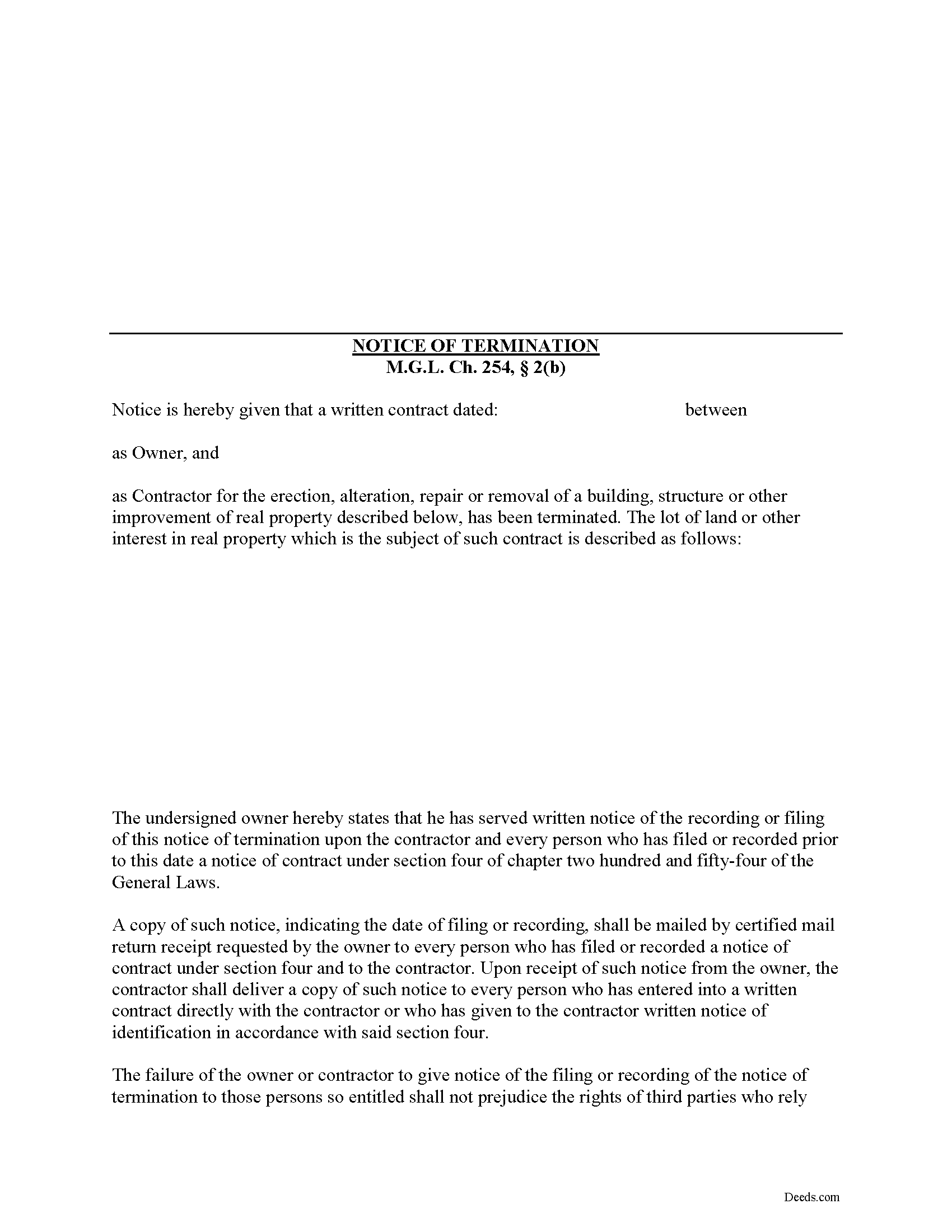
A Notice of Termination must be sent to all parties who have filed a Notice of Contract, if the contract has been terminated prior to the filing or recording of a Notice of Substantial Completion. M.G.L. Ch. 254, 2(b). If the contract is terminated, the owner must execute and file or record a Notice of Termination in the registry of deeds for the county where the subject property is located. Id.
The Notice of Termination includes the dates of the contract, names of the owner and contractor, and a legal description of the subject property. Id.
A copy of the Notice, indicating the date of filing or recording, must be mailed by the owner, via certified mail with return receipt requested, to every person who has filed or recorded a Notice of Contract and to the contractor. Id. When the contractor receives the Notice of Termination from the owner, the contractor must in turn deliver a copy to every person who has entered into a written contract directly with the contractor or who has given the contractor a written Notice of Identification. Id.
The failure of the owner or contractor to give notice of the filing or recording of the Notice of Termination to any person entitled w... More Information about the Massachusetts Notice of Termination
Notice of Substantial Completion
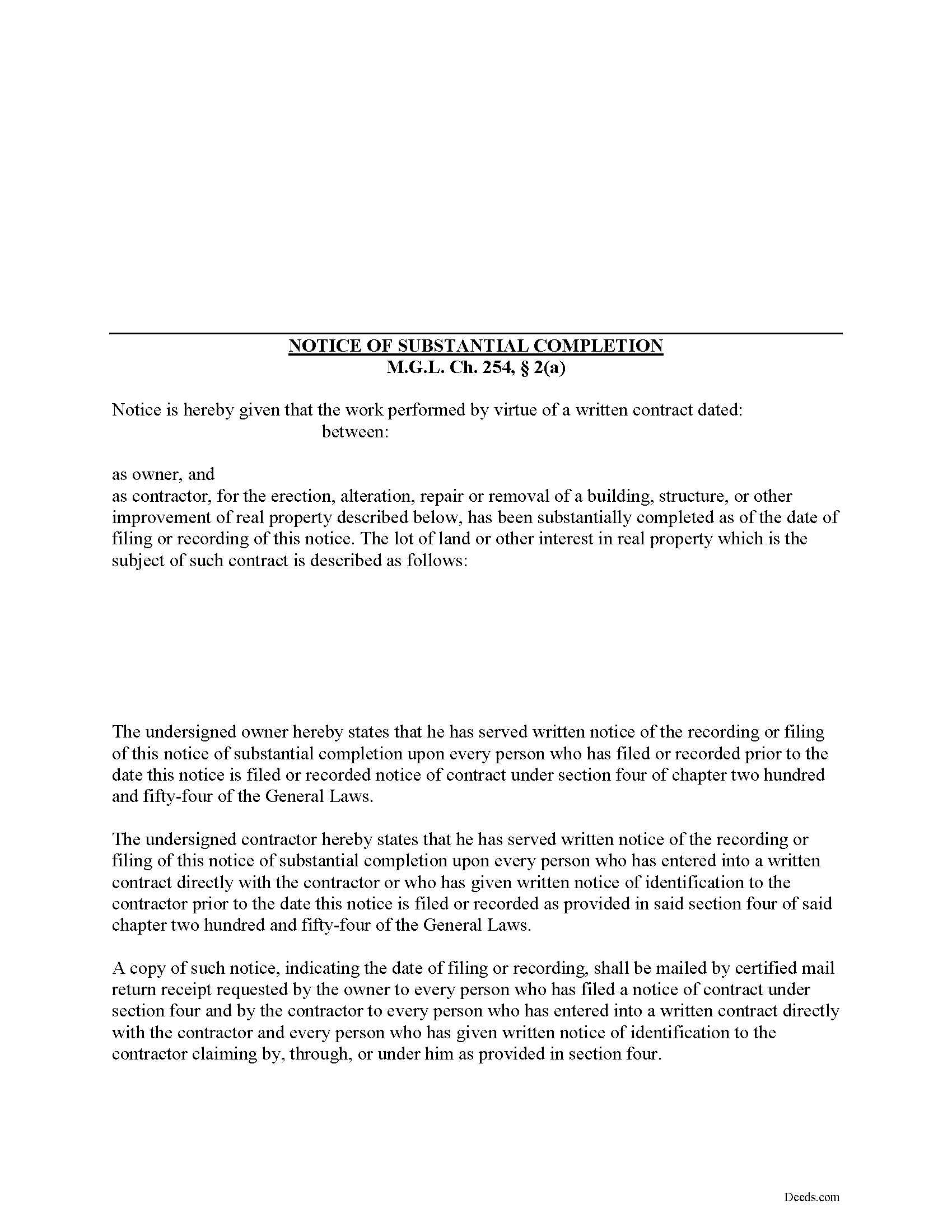
In Massachusetts, a Notice of Substantial Completion must be filed or recorded with the registry of deeds upon or after the contract has reached substantial completion. M.G.L. Ch. 254, 2(a). "Substantial completion" occurs when the work under the written contract is sufficiently complete so that it can be occupied or utilized for its intended use. Id.
The Notice of Substantial Completion contains the date of the written contact, names of the owner and contractor, and a legal property description sufficient for identification. Id.
The owner also signs the Notice and states that he has served a copy of the Notice upon every person who has filed or recorded a Notice of Contract. Id
A copy of the Notice, indicating the date of filing or recording, must also be mailed by the owner, via certified mail with return receipt requested, to every person who has filed a Notice of Contract. Id. Additionally, the contractor must serve a copy to every person who has entered into a written contract directly with the contractor as well as to every person who has given a written Notice of Identification to the contractor. Id.
The failure of the owner or contractor to give notice of the f... More Information about the Massachusetts Notice of Substantial Completion
Bond for Written Contract
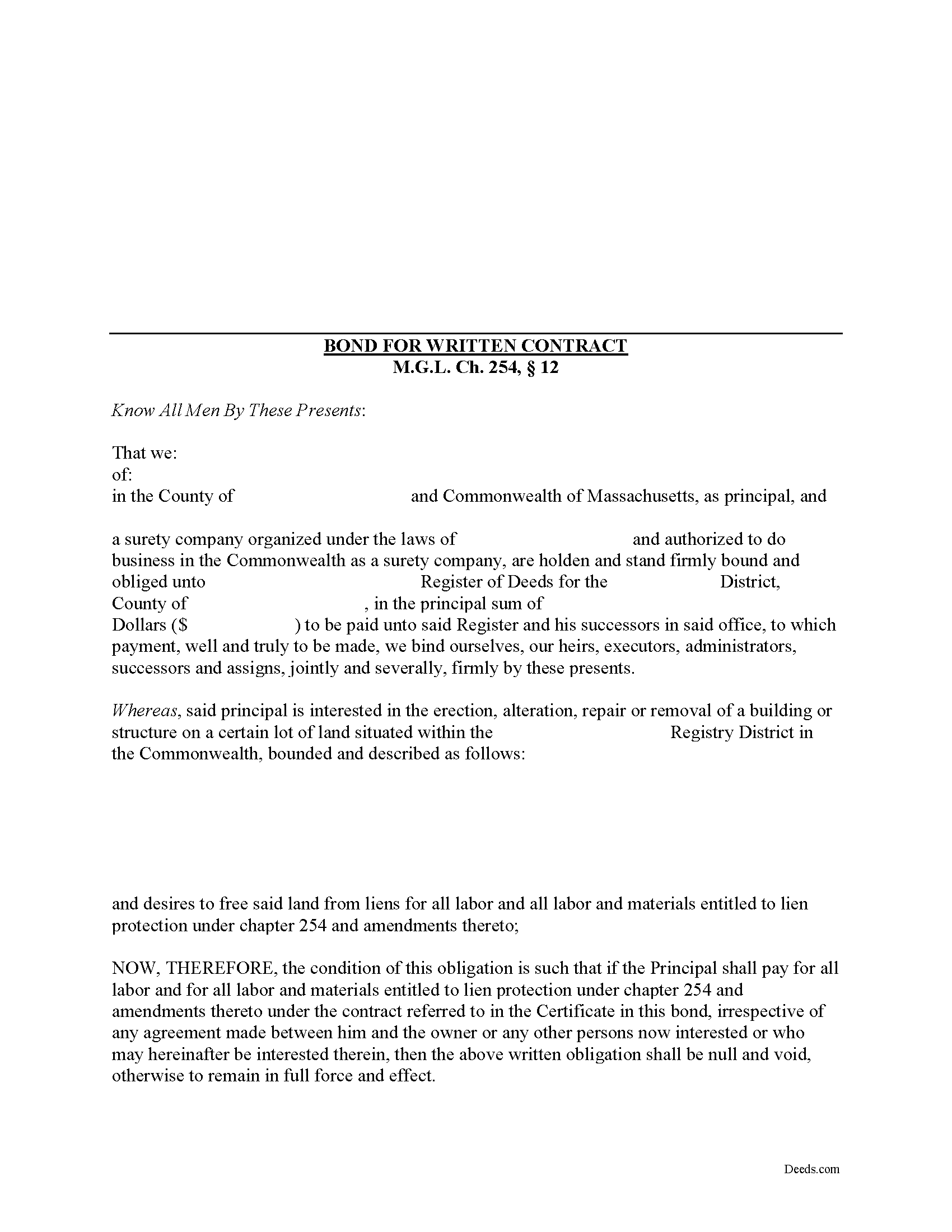
Executing a surety bond is a great method to avoid ever having a lien placed on a property. A surety bond is a written promise to pay by the surety who guarantees any potential lien claimant or other party that he or she will make the necessary payments in connection with the written contract.
Any person, including the owner, with an interest in connection with a written contract may record, in the registry of deeds in the county or district where the land lies, a bond of a Massachusetts-authorized surety company in a penal sum equal to the contract sum or, if the contract does not contain a contract sum, in a penal sum equal to that person's fair estimate of the contract sum, all as set forth in the certificate on the bond. M.G.L. Ch. 254, 12.
Recording any such bond prevents any eligible claimant from attaching a lien for labor and/or materials performed under the contract in respect to which such bond is given. Id.
A valid bond for written contract identifies the parties, the location of the project, the amount of the bond, and relevant dates. Submit the completed and notarized bond document to the local recording office. Note that the register of deeds may refuse to ... More Information about the Massachusetts Bond for Written Contract
Dissolution by Bond
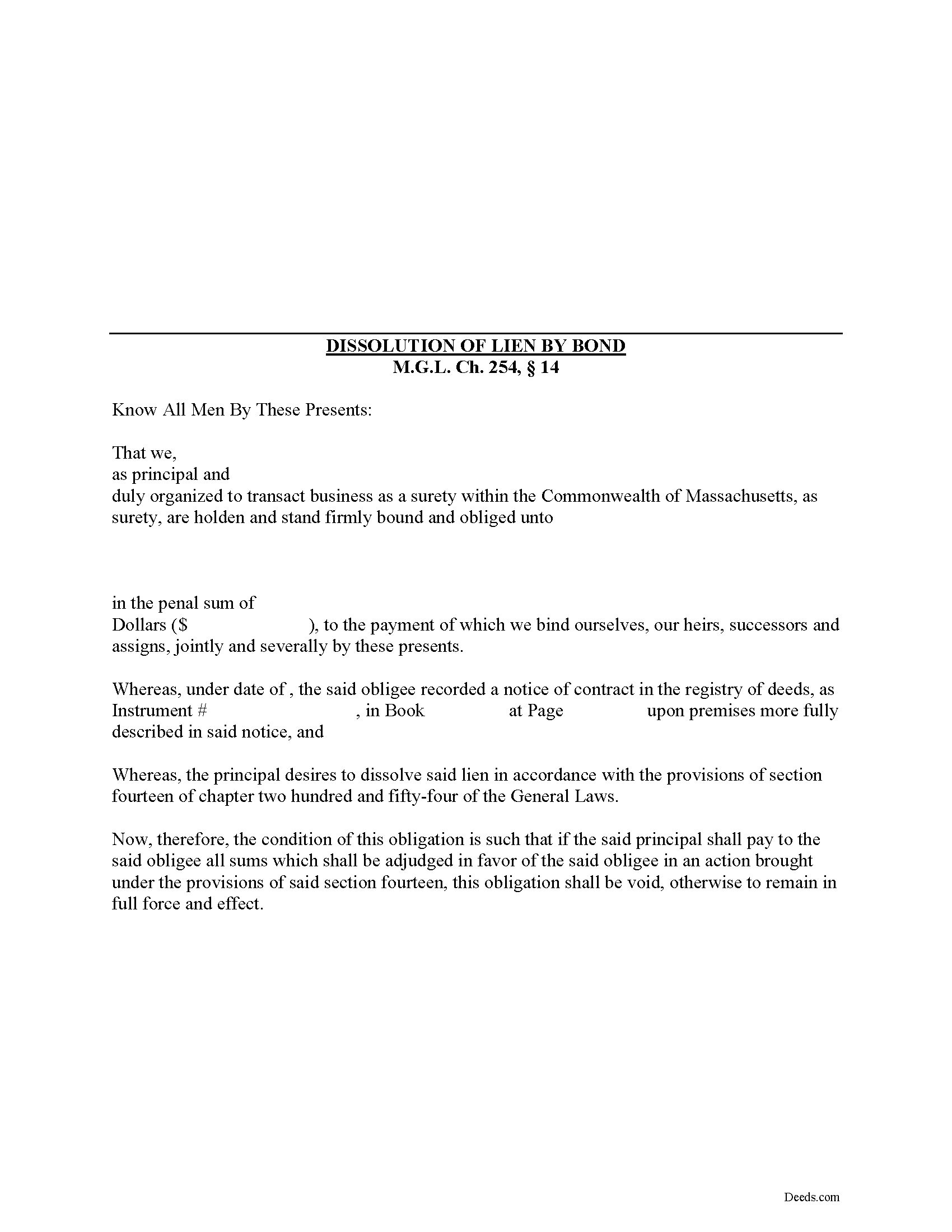
Posting a Lien Bond in Massachusetts
Once a lien is placed on real estate, it can cause multiple issues for the owner. For example, since a lien is a type of encumbrance, it appears on the title and might make it difficult to sell or mortgage the property. Often, a lien claimant will agree to dissolve a lien in exchange for the responsible party posting a bond that guarantees performance.
Any person with an interest may dissolve a lien by recording or causing to be recorded in the county registry of deeds where the land lies, a surety bond by a company authorized to do business in Massachusetts, in a penal sum equal to the amount of the lien sought to be dissolved conditioned for the payment of any sum which the claimant may recover on his claim for labor or labor and materials. M.G.L. Ch. 254, 14.
Upon the recording of the bond, the lien shall be dissolved. Id. Notice of the recording shall be given to the claimant by serving on the claimant a copy of the notice of recording together with a copy of the bond by an officer qualified to serve civil process or by delivering same to the claimant. Id. The claimant may enforce the bond by a civil action commenced within ninet... More Information about the Massachusetts Dissolution by Bond
Dissolution of Lien
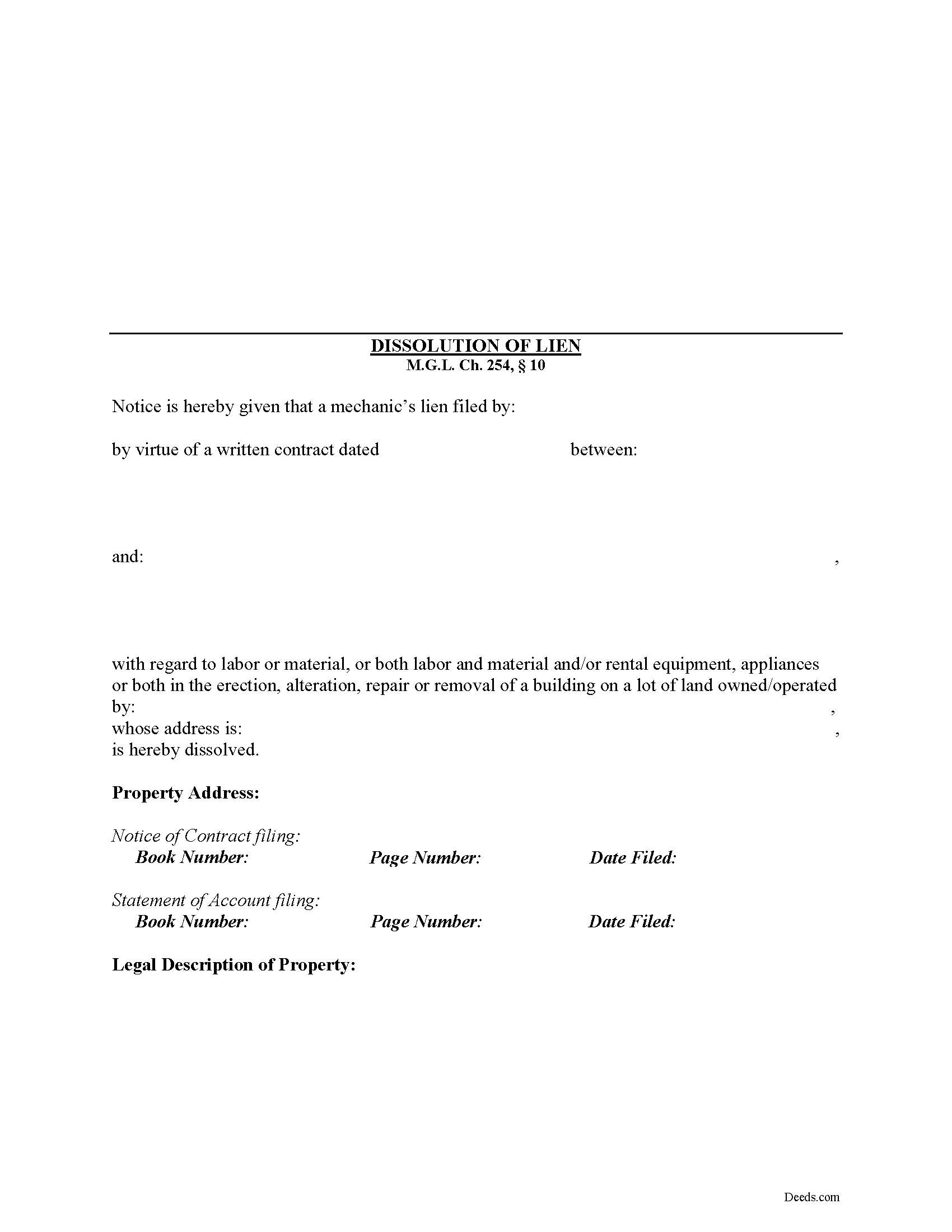
Dissolving a Lien in Massachusetts
Under M.G.L. Ch. 254, 10, liens that are no longer needed or must be discharged for any other reason can be lifted by filing a Dissolution of Lien in the country registry of deeds where the Notice of Contract was originally filed.
The Dissolution of Lien contains the names and addresses of the parties to the contract, the property owner's name and address, the recording information for the Notice of Contract and Statement of Account, and a legal description of the subject property. Id. Once properly filed and recorded, the clerk will strike the lien from the record. Id.
This article is provided for informational purposes only and should not be relied upon as a substitute for the advice from an attorney. If you have questions about dissolving a lien, or any other issues related to lien laws in Massachusetts, please consult with an attorney.... More Information about the Massachusetts Dissolution of Lien
Contractor Partial Waiver and Subordination of Lien
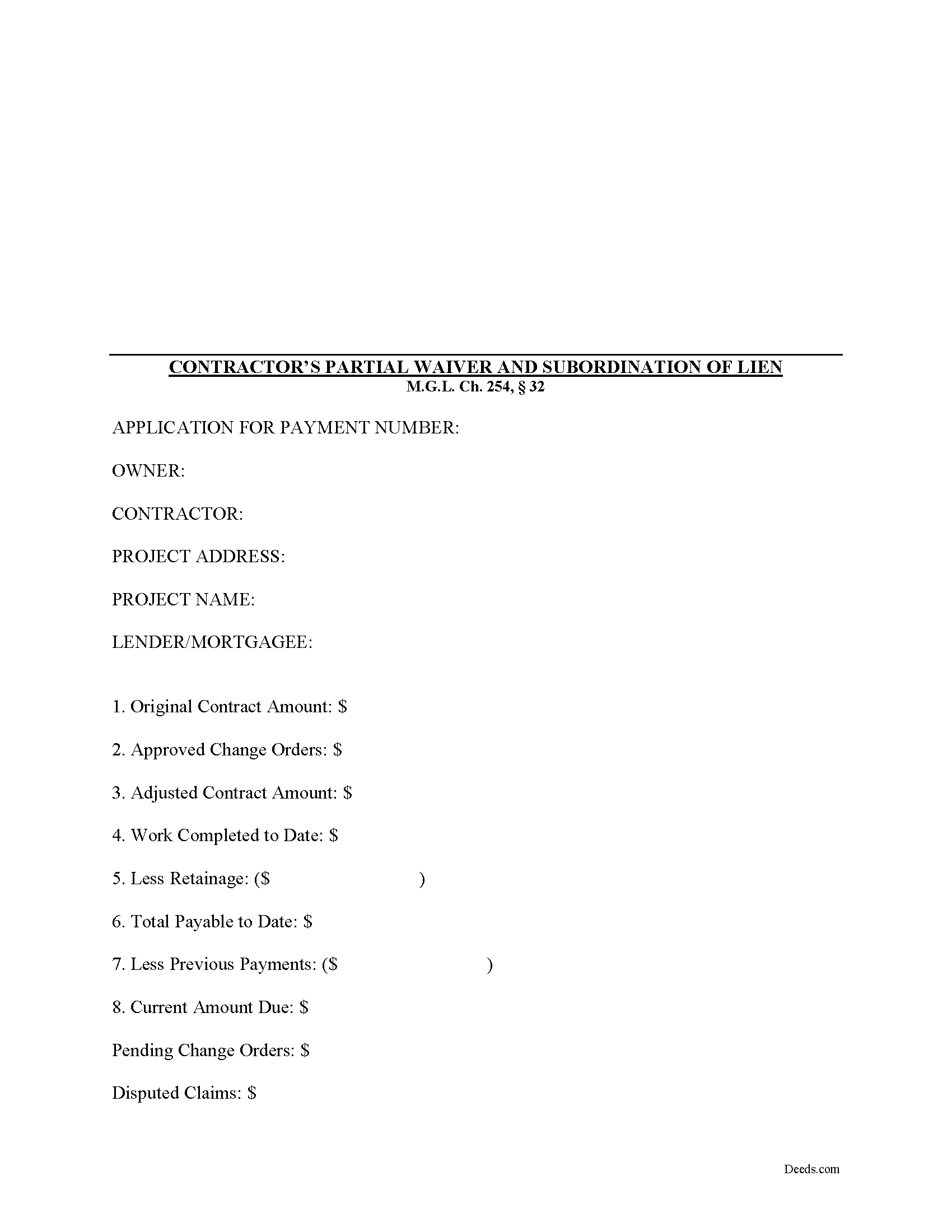
Massachusetts Contractors Partial Waiver and Subordination of Lien
The Contractor's Partial Waiver and Subordination of Lien form is useful for situations where a contractor seeks a partial payment to waive lien rights up to a specific date.
Lien waivers are used between contractors (also subcontractors and suppliers) and property owners as a quid-pro-quo arrangement between the contractor and owner. The purpose of a waiver is to influence payment from the owner in return for the contractor waiving future mechanic's lien rights.
In Massachusetts, any promise or agreement that bars the filing of a Notice of Contract is void and unenforceable, but that prohibition does not apply to full or partial lien waivers or dissolutions of liens. M.G.L. Ch. 254, 32. Therefore, the parties can use waivers to facilitate payment and ease concerns of hidden liens.
In general, Massachusetts recognizes four types of lien waivers: Partial Waiver by Contractor, Full Conditional Waiver by Contractor, Partial Waiver by Subcontractor, and Full Conditional Waiver by Subcontractor. Id. As their titles suggest, contractors should use a contractor's waiver and subcontractors should use a waiver... More Information about the Massachusetts Contractor Partial Waiver and Subordination of Lien
Contractor Full Conditional Lien Waiver
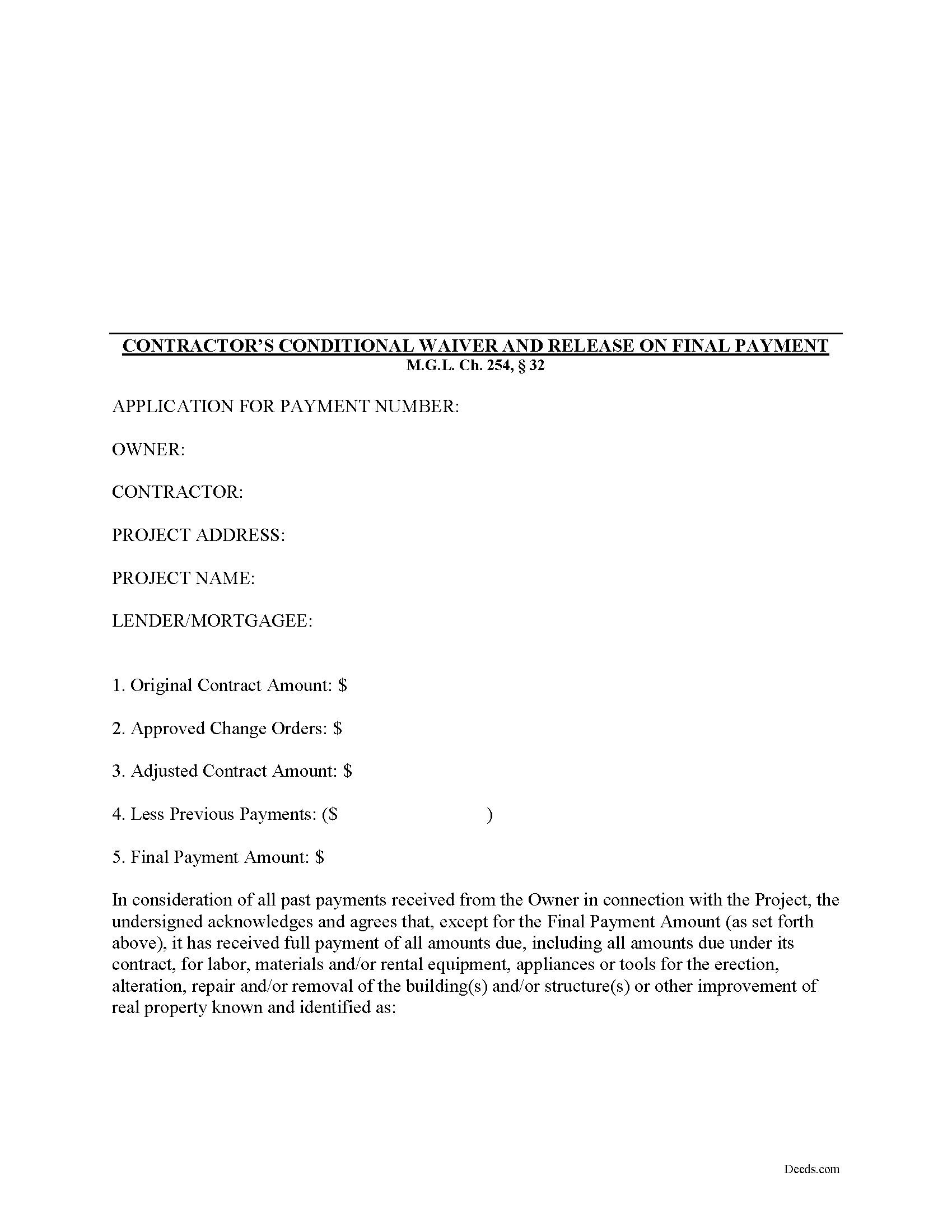
Massachusetts Contractor's Full Conditional Lien Waiver
The Contractor's Full Conditional Lien Waiver is useful for situations where a contractor seeks full payment, but will only waive lien rights after the bank pays the check.
Lien waivers are used between contractors (also subcontractors and suppliers) and property owners as a quid-pro-quo arrangement between the contractor and owner. The purpose of a waiver is to influence payment from the owner in return for the contractor waiving future mechanic's lien rights.
In Massachusetts, any promise or agreement that bars the filing of a Notice of Contract is void and unenforceable, but that prohibition does not apply to full or partial lien waivers or dissolutions of liens. M.G.L. Ch. 254, 32. Therefore, the parties can use waivers to facilitate payment and ease concerns of hidden liens.
In general, Massachusetts recognizes four types of lien waivers: Partial Waiver by Contractor, Full Conditional Waiver by Contractor, Partial Waiver by Subcontractor, and Full Conditional Waiver by Subcontractor. Id. As their titles suggest, contractors should use a contractor's waiver and subcontractors should use a waiver designated f... More Information about the Massachusetts Contractor Full Conditional Lien Waiver
Subcontractor Partial Waiver and Subordination of Lien
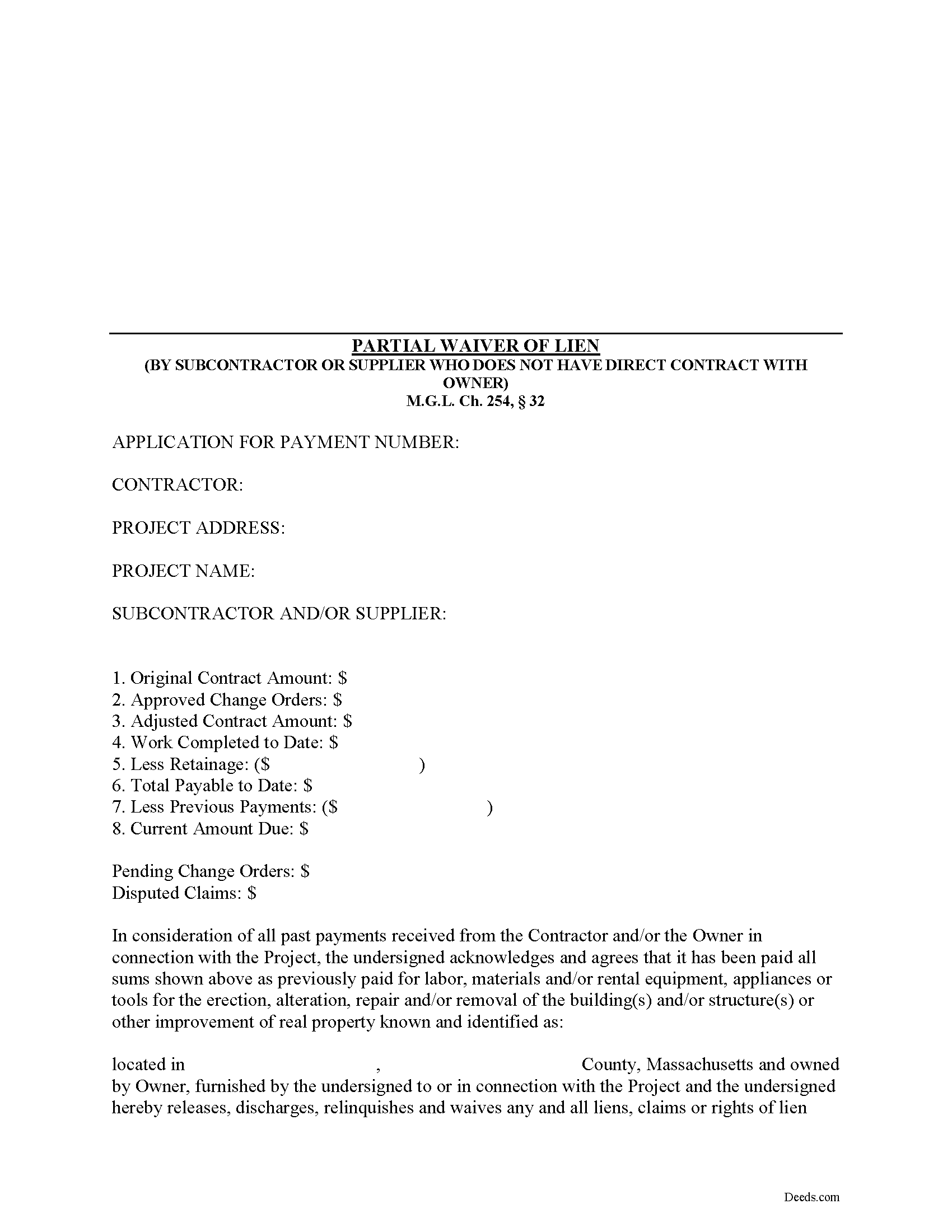
Massachusetts Subcontractors Partial Waiver and Subordination of Lien
The Subcontractor's Partial Waiver and Subordination of Lien form is useful for situations where a subcontractor seeks a partial payment to waive lien rights up to a specific date.
Lien waivers are used between contractors (also subcontractors and suppliers) and property owners as a quid-pro-quo arrangement between the contractor and owner. The purpose of a waiver is to influence payment from the owner in return for the contractor waiving future mechanic's lien rights.
In Massachusetts, any promise or agreement that bars the filing of a Notice of Contract is void and unenforceable, but that prohibition does not apply to full or partial lien waivers or dissolutions of liens. M.G.L. Ch. 254, 32. Therefore, the parties can use waivers to facilitate payment and ease concerns of hidden liens.
In general, Massachusetts recognizes four types of lien waivers: Partial Waiver by Contractor, Full Conditional Waiver by Contractor, Partial Waiver by Subcontractor, and Full Conditional Waiver by Subcontractor. Id. As their titles suggest, contractors should use a contractor's waiver and subcontractors should use... More Information about the Massachusetts Subcontractor Partial Waiver and Subordination of Lien
Subcontractor Full Conditional Lien Waiver
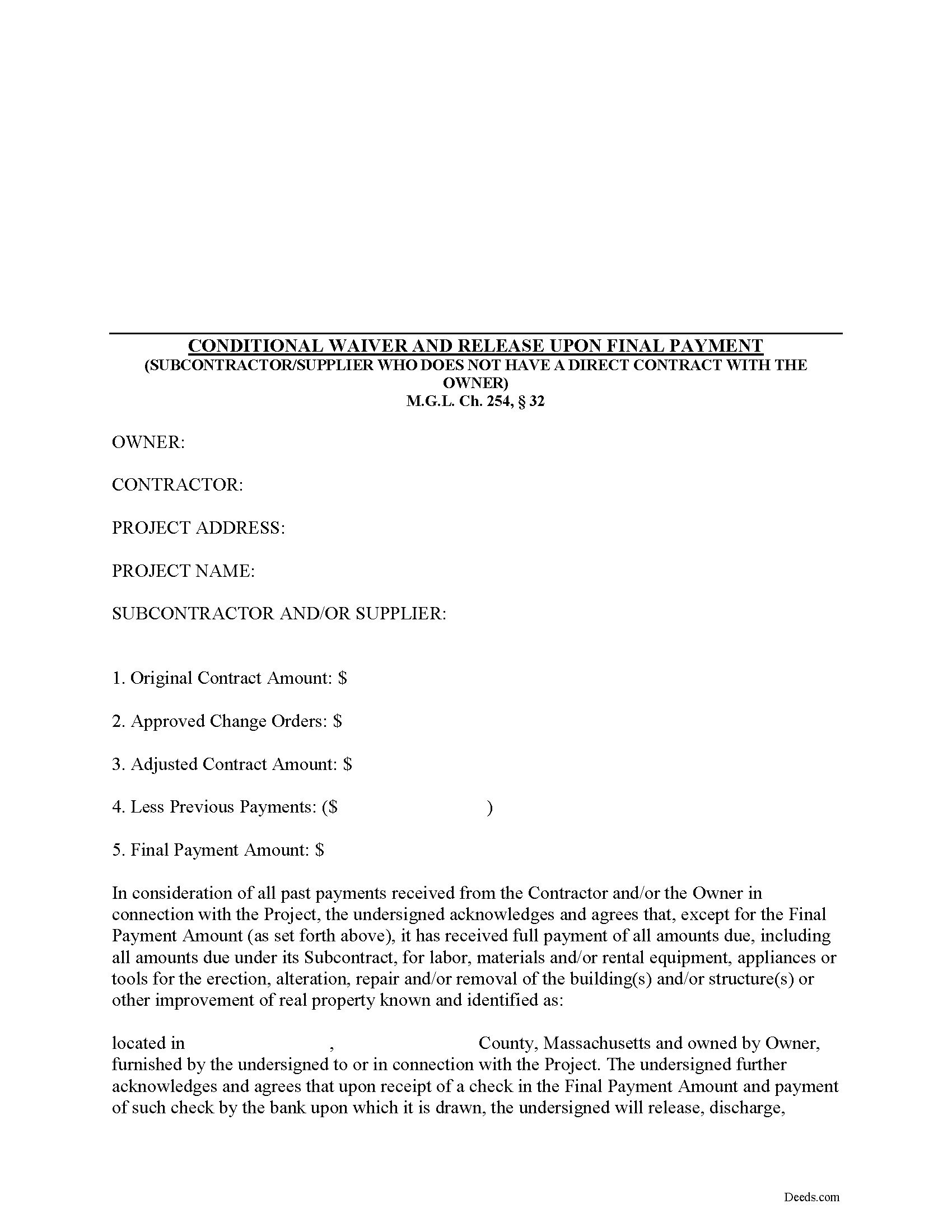
Massachusetts Subcontractor's Full Conditional Lien Waiver
The Subcontractor's Full Conditional Lien Waiver is useful for situations where a subcontractor seeks full payment, but will only waive lien rights after the bank pays the check.
Lien waivers are used between contractors (also subcontractors and suppliers) and property owners as a quid-pro-quo arrangement between the contractor and owner. The purpose of a waiver is to influence payment from the owner in return for the contractor waiving future mechanic's lien rights.
In Massachusetts, any promise or agreement that bars the filing of a Notice of Contract is void and unenforceable, but that prohibition does not apply to full or partial lien waivers or dissolutions of liens. M.G.L. Ch. 254, 32. Therefore, the parties can use waivers to facilitate payment and ease concerns of hidden liens.
In general, Massachusetts recognizes four types of lien waivers: Partial Waiver by Contractor, Full Conditional Waiver by Contractor, Partial Waiver by Subcontractor, and Full Conditional Waiver by Subcontractor. Id. As their titles suggest, contractors should use a contractor's waiver and subcontractors should use a waiver des... More Information about the Massachusetts Subcontractor Full Conditional Lien Waiver
Estate Tax Affidavit
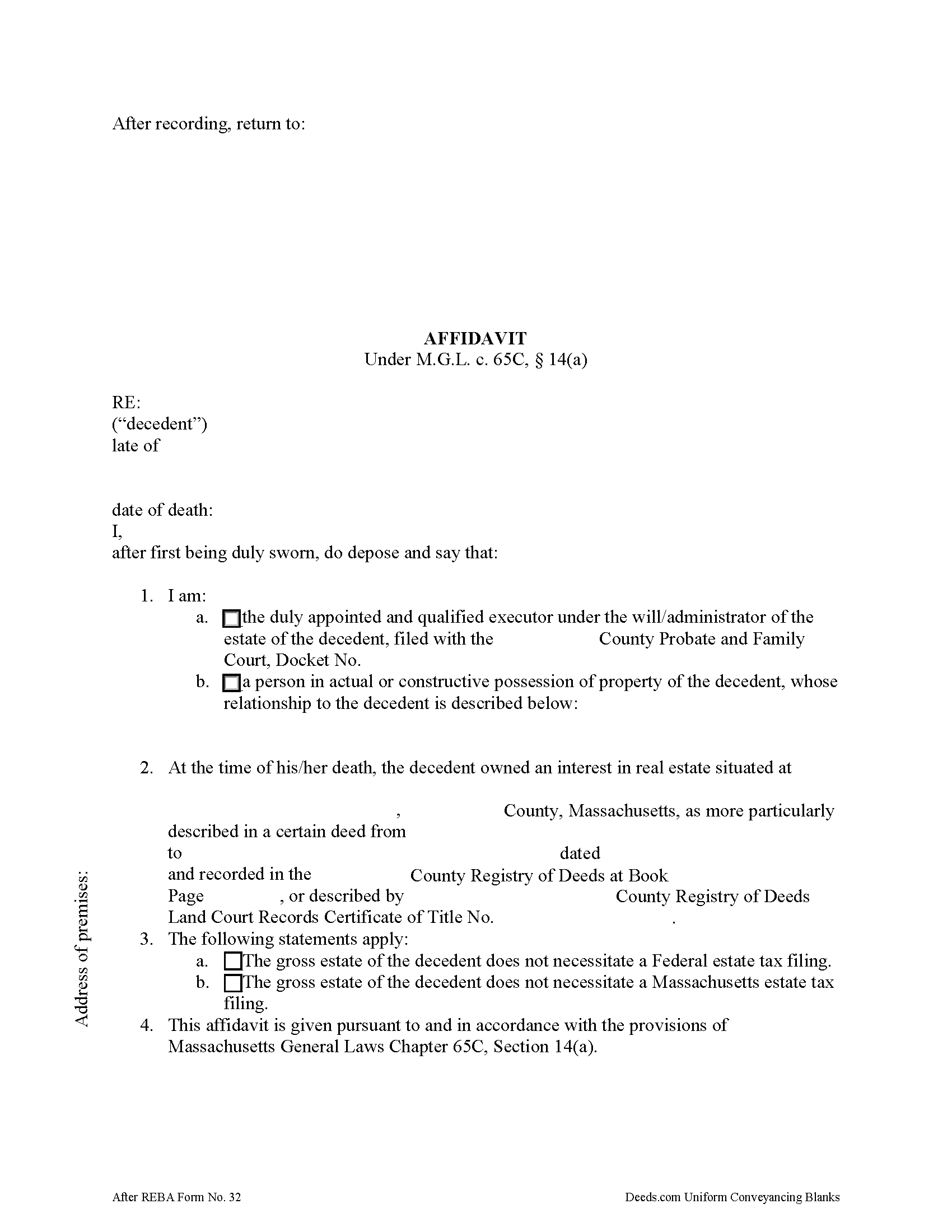
In Massachusetts, upon death, a lien attaches to a decedent's real property for ten years, or until the estate tax is paid, or an affidavit showing that the decedent's gross estate does not require an estate tax filing is recorded by a personal representative (or other qualified person under G. L. c. 65C, 6(a)) in the Registry of Deeds.
Use the affidavit of estate tax under M.G.L. c. 65C, 14(a) to release the lien on the decedent's property. The affidavit should include the name, address, and date of death of the decedent. The affiant shall indicate whether he/she is the personal representative of the decedent's probated estate, or, if the property is not subject to probate, then the affiant's relationship to the decedent.
The document's recitals also include the address of the premises affected and the prior instrument containing a legal description of the property. All statements contained within the affidavit are made by the affiant on penalty of perjury and sworn to before a notary public.
Contact a lawyer with questions about the Massachusetts estate tax and affidavits relating to decedents' estates in the Commonwealth of Massachusetts.
(Massachusetts ETA Packa... More Information about the Massachusetts Estate Tax Affidavit
Trustee Certificate
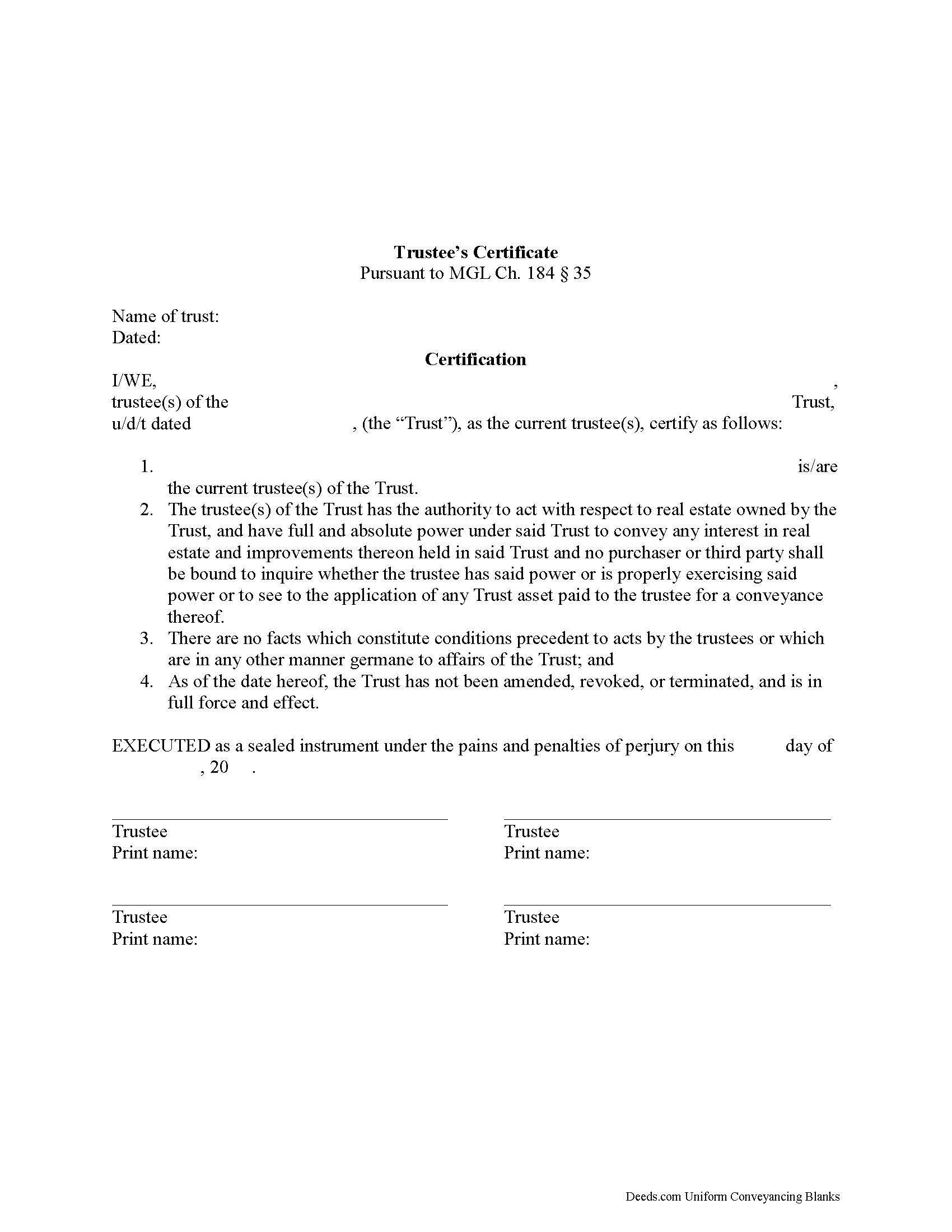
Massachusetts Trustee's Certificate (M.G.L. Ch. 184 Sec. 35)
Include this form with a conveyance of Massachusetts real estate by one or more trustees of a recorded trust.
(Massachusetts TC Package includes form, guidelines, and completed example)... More Information about the Massachusetts Trustee Certificate